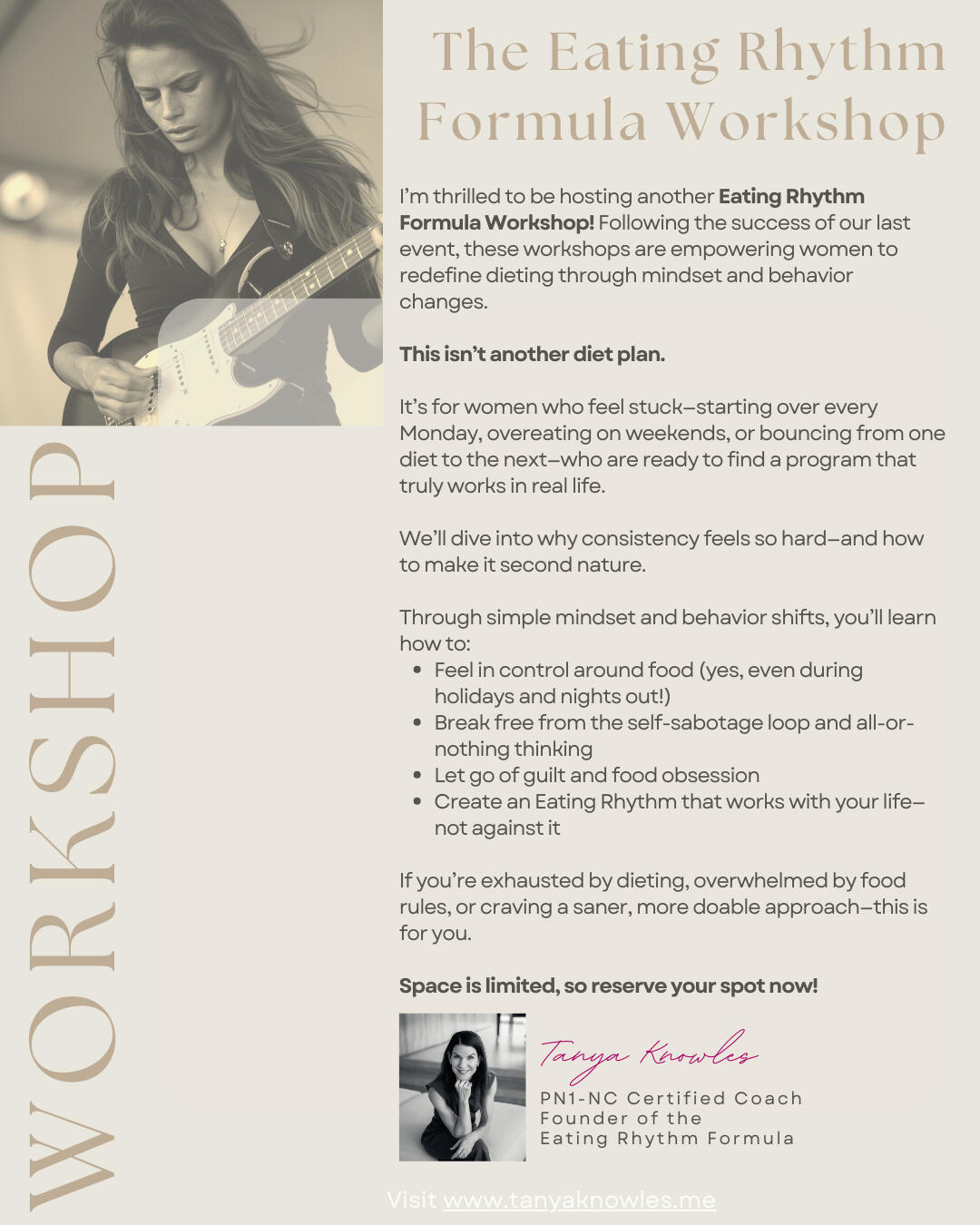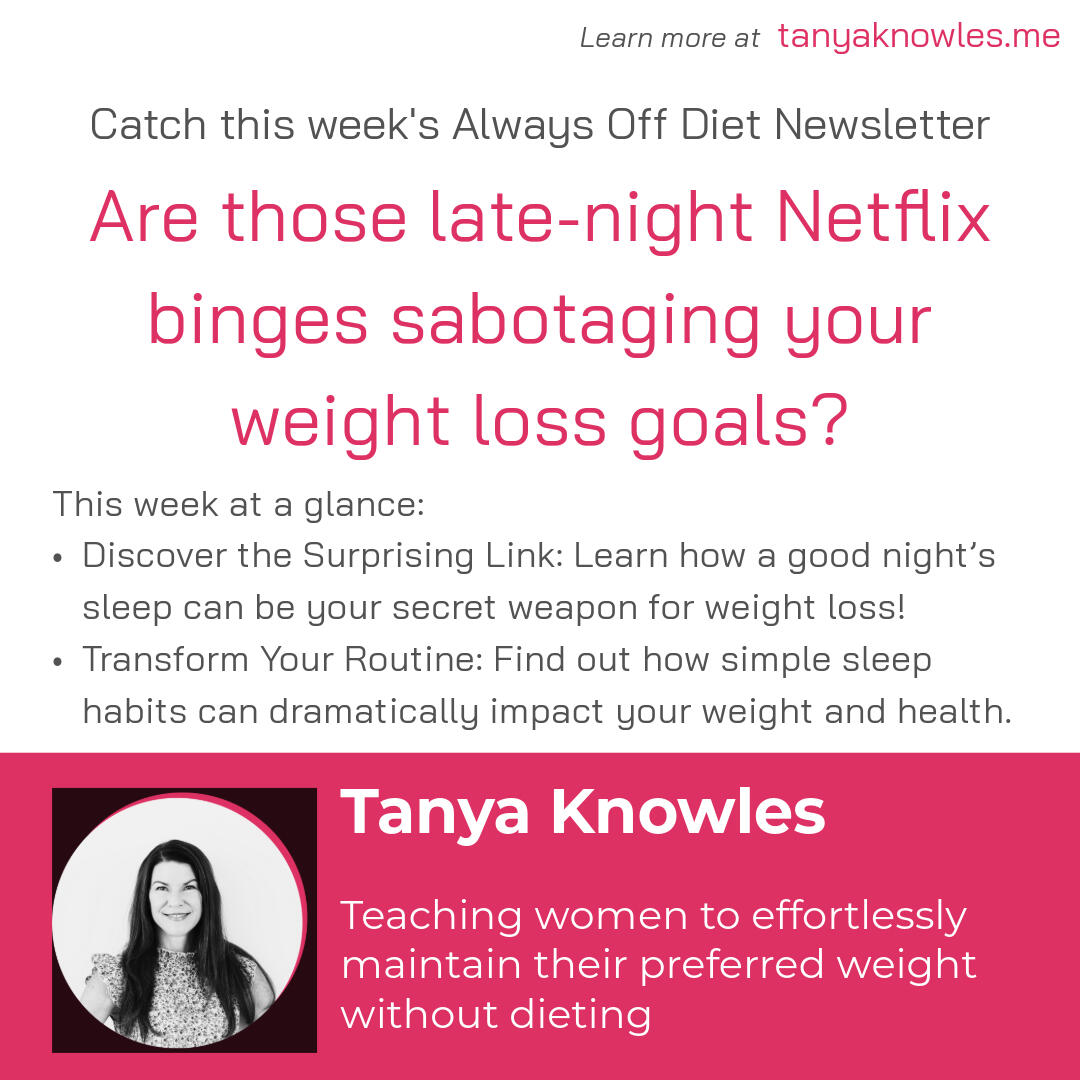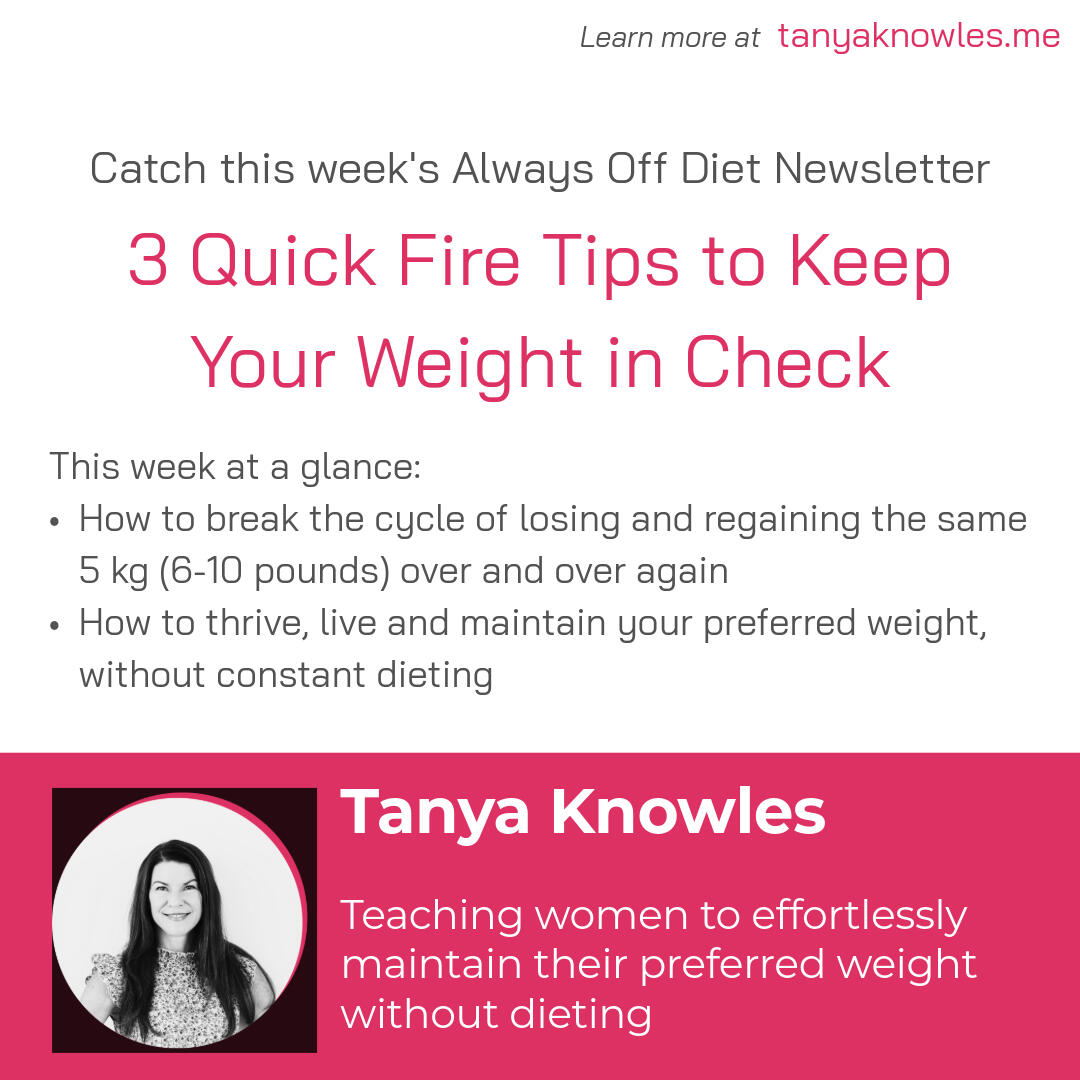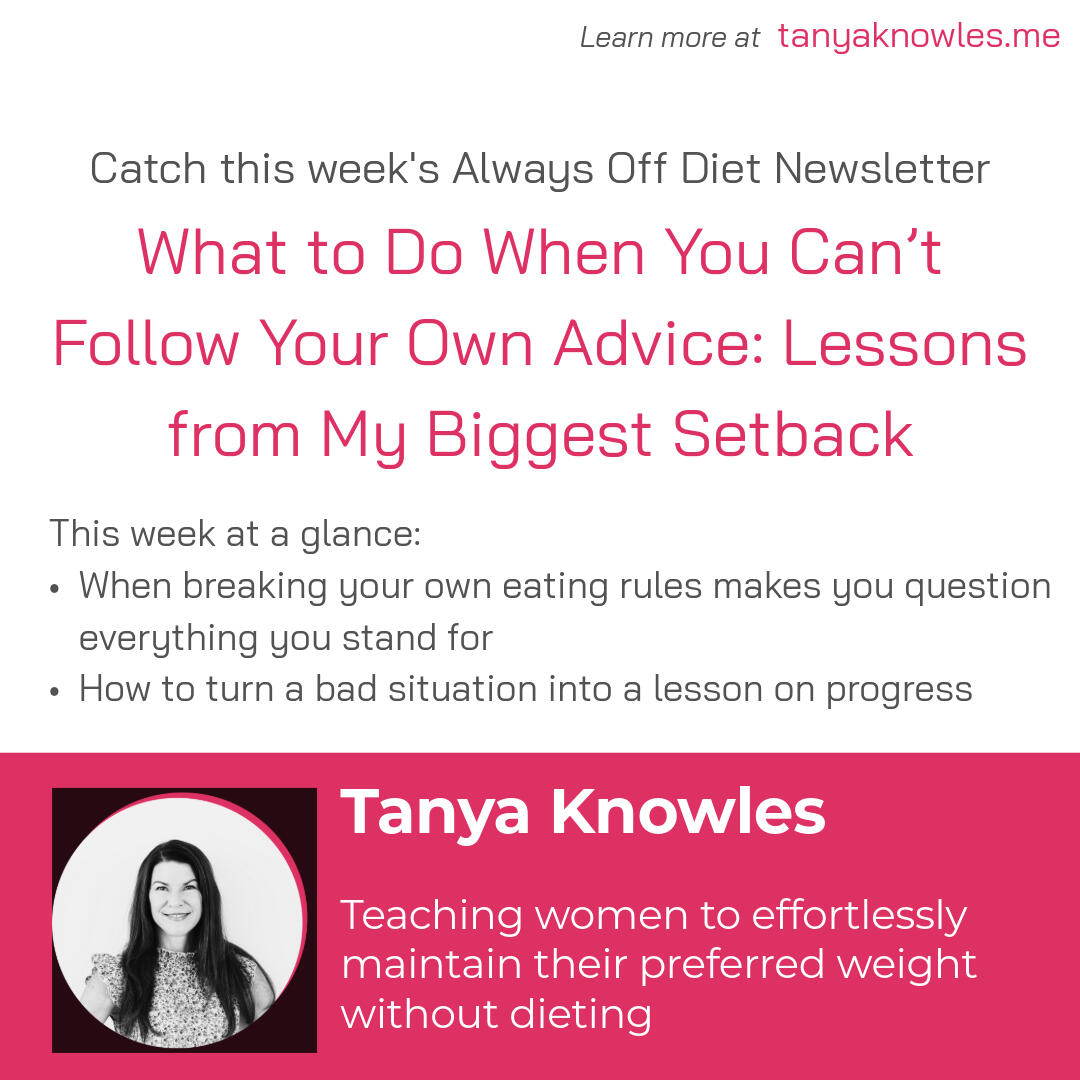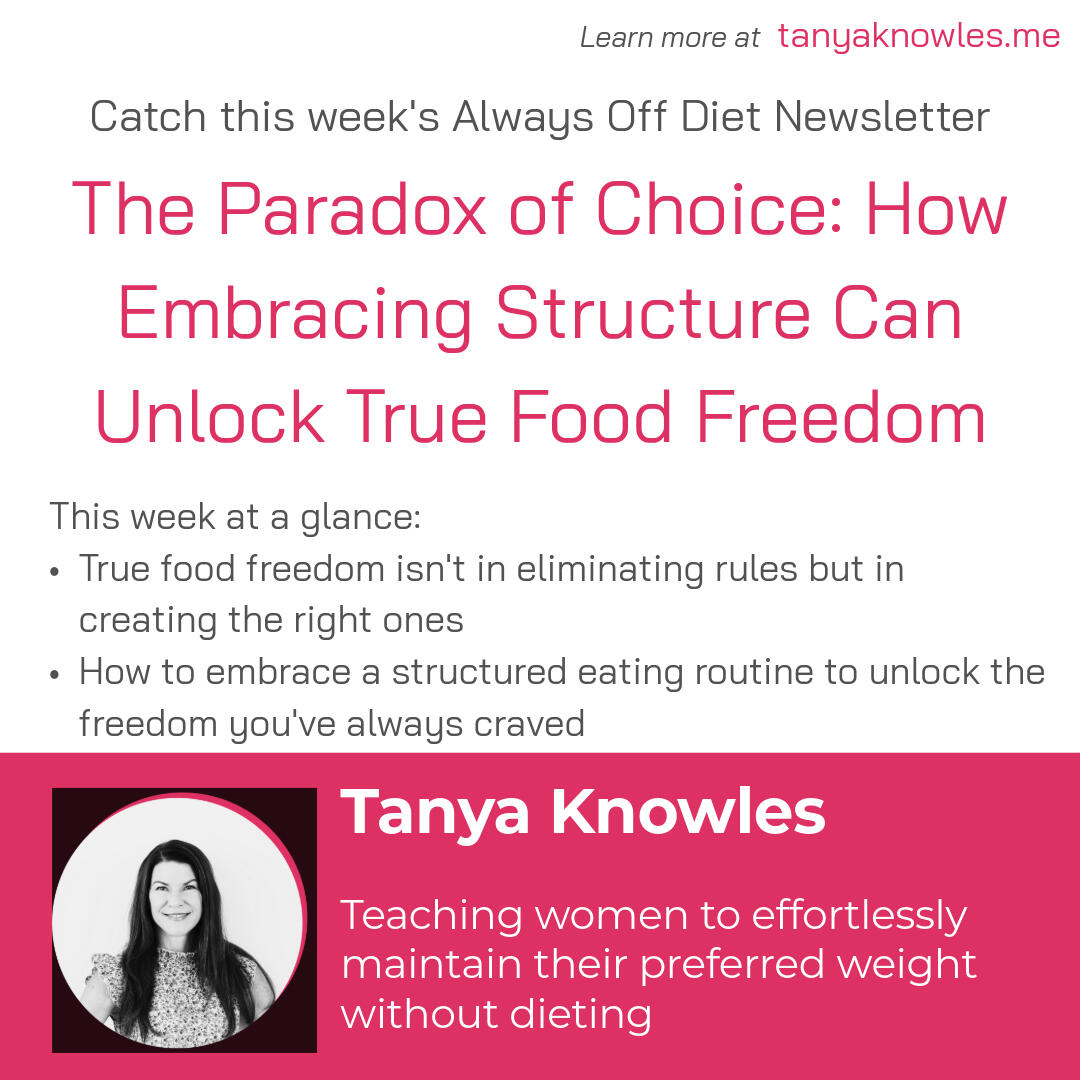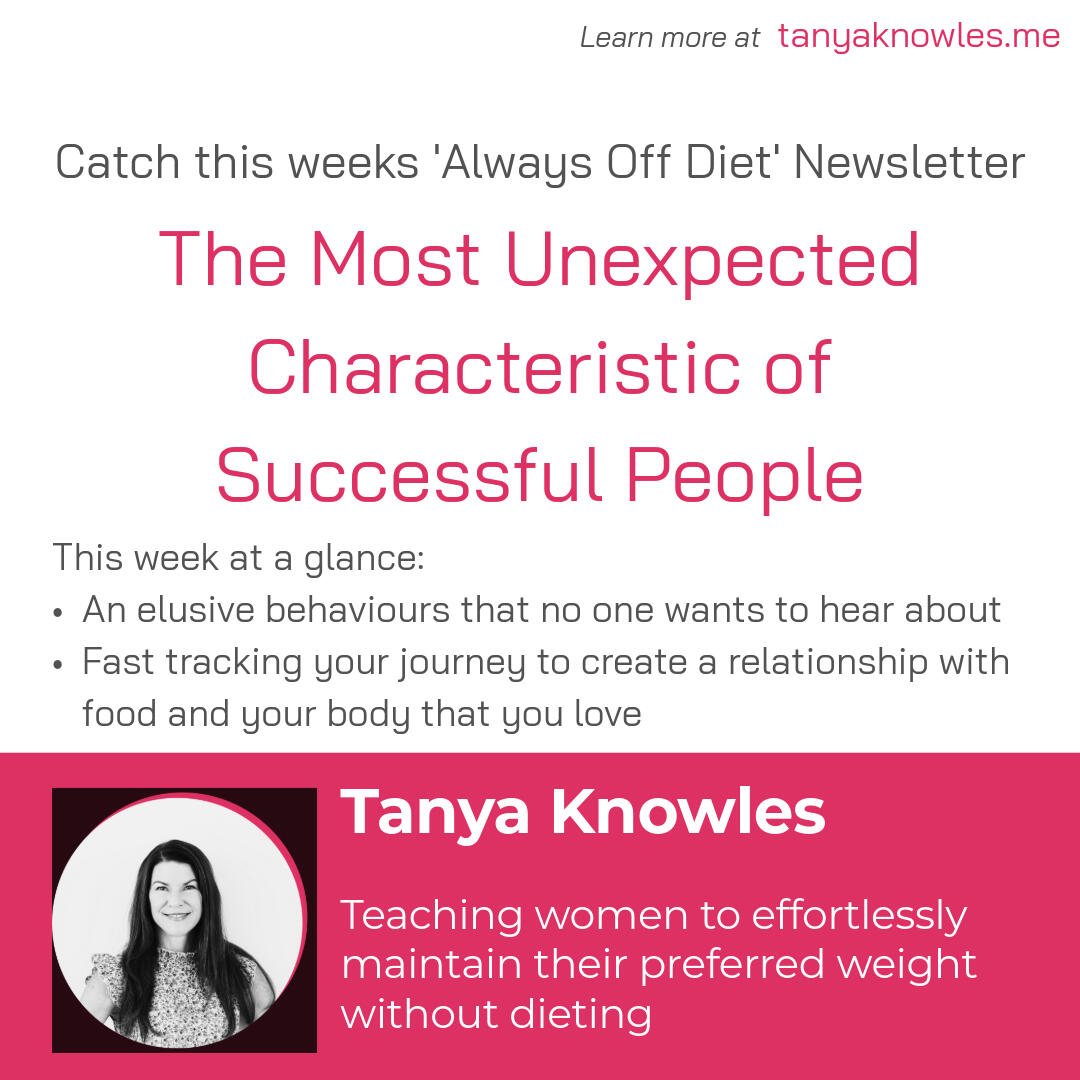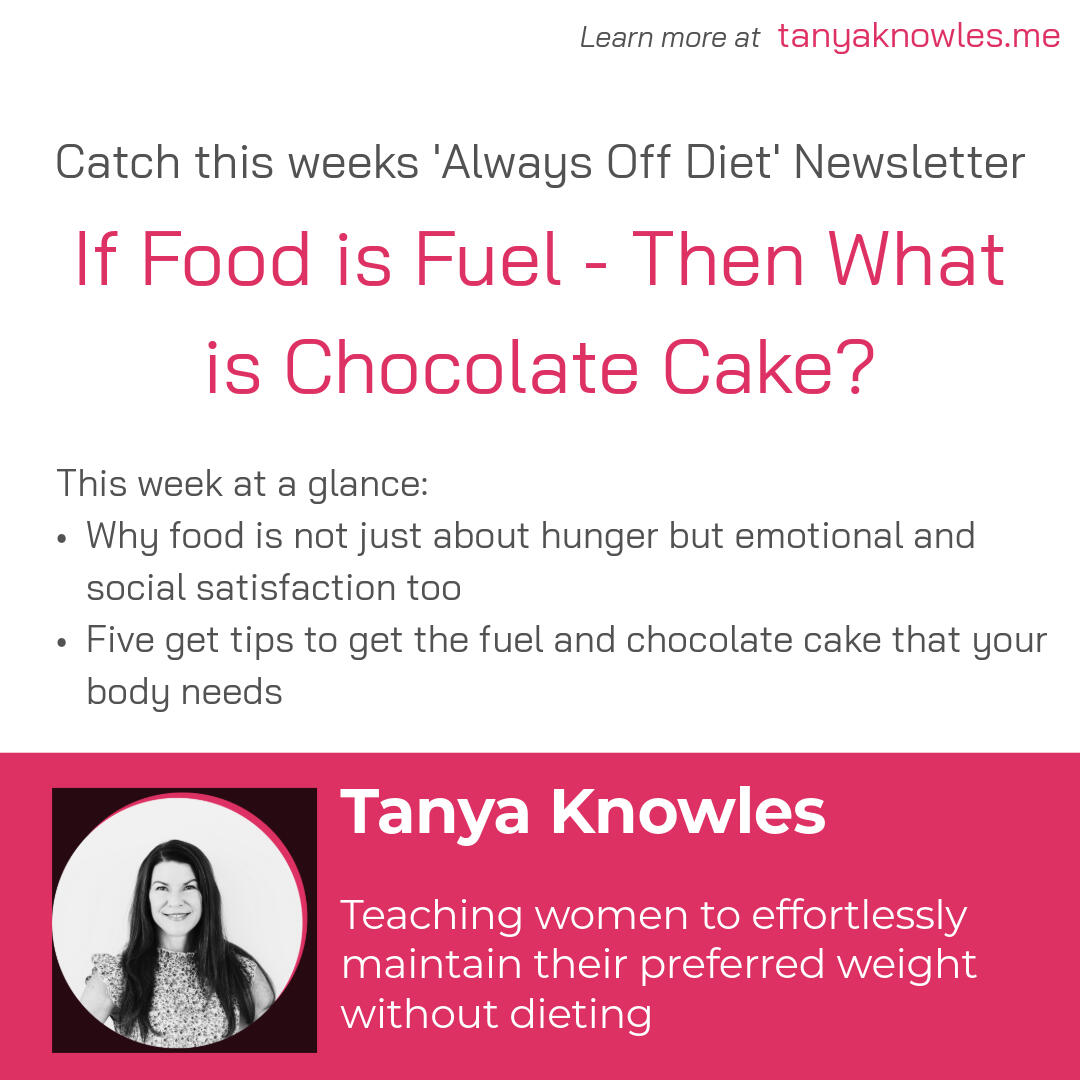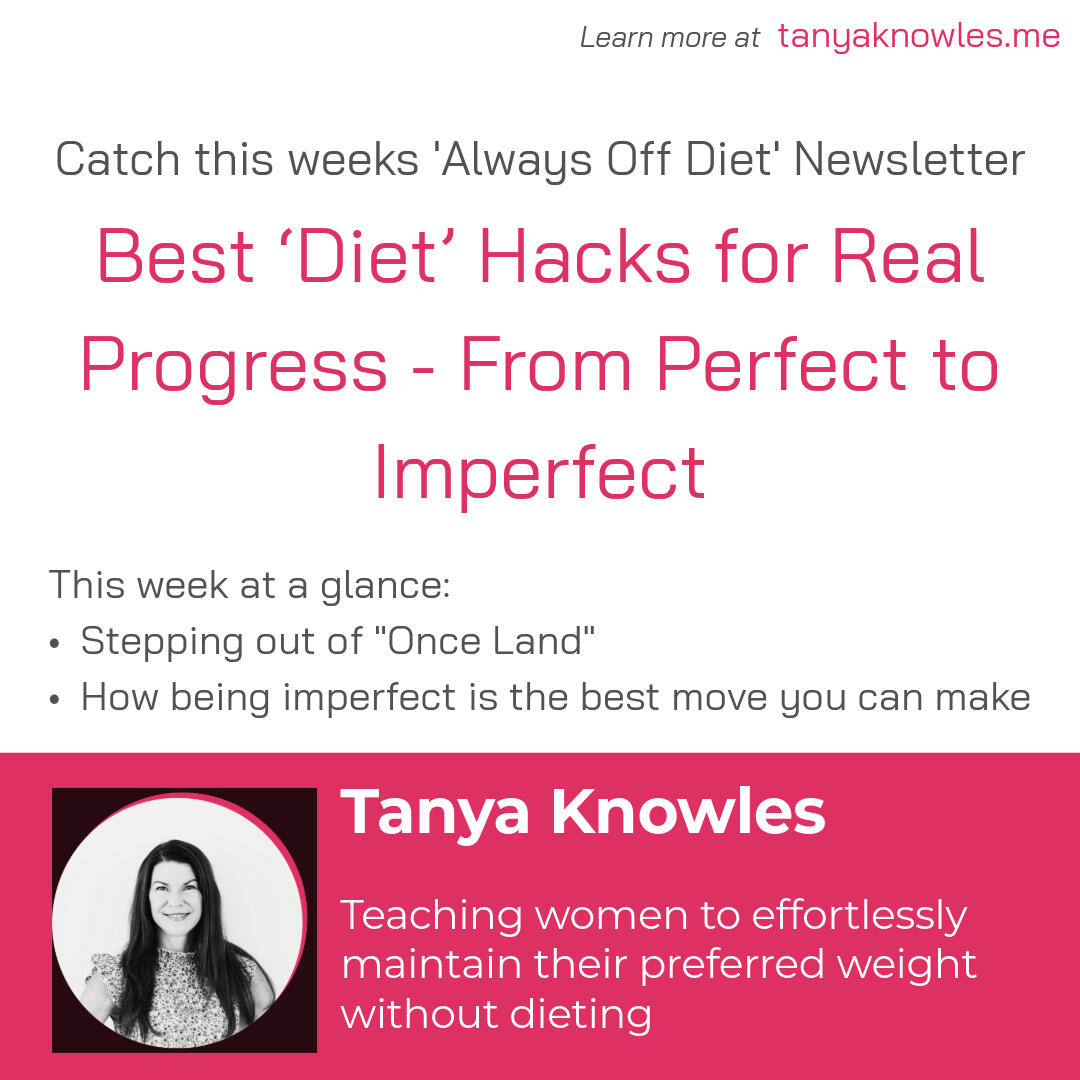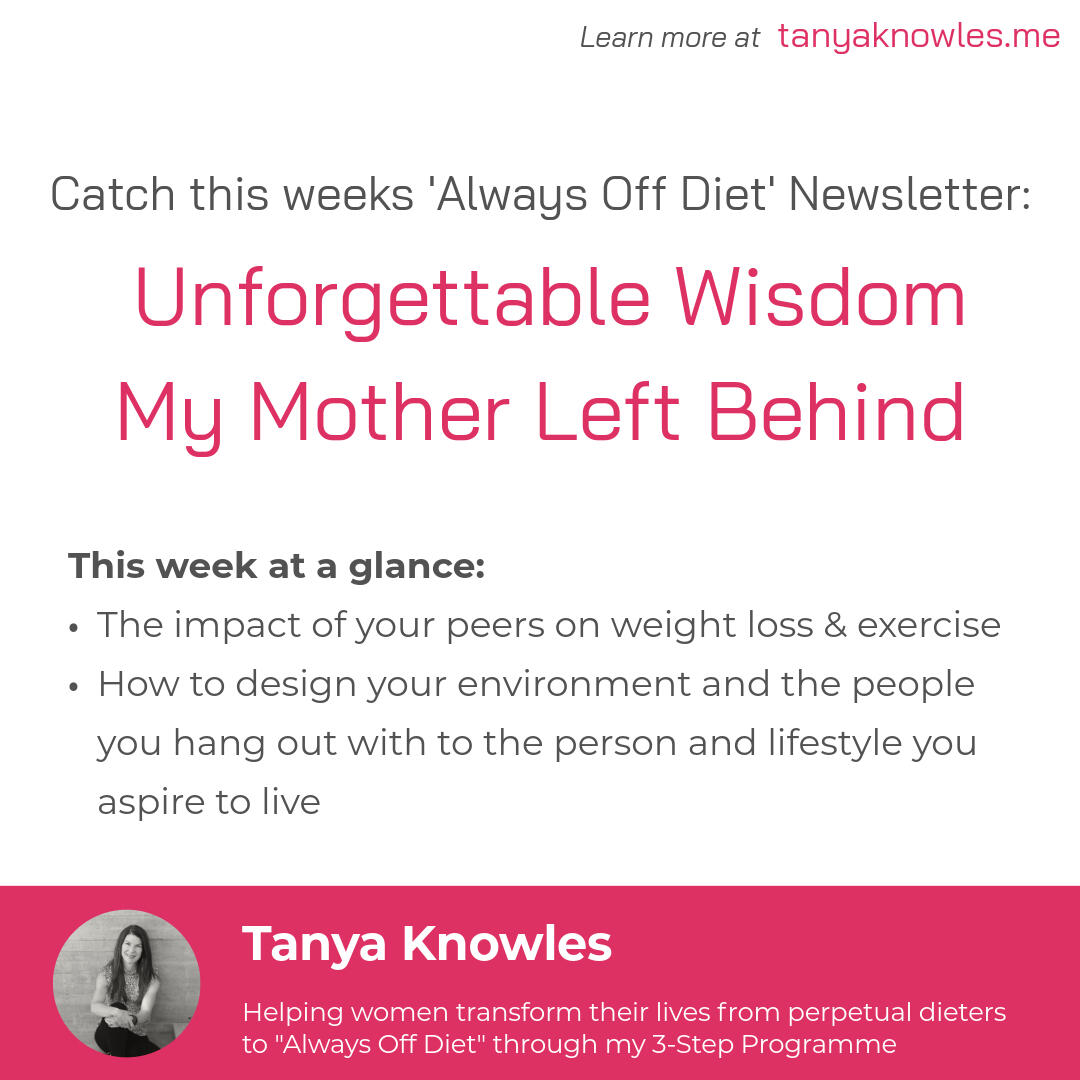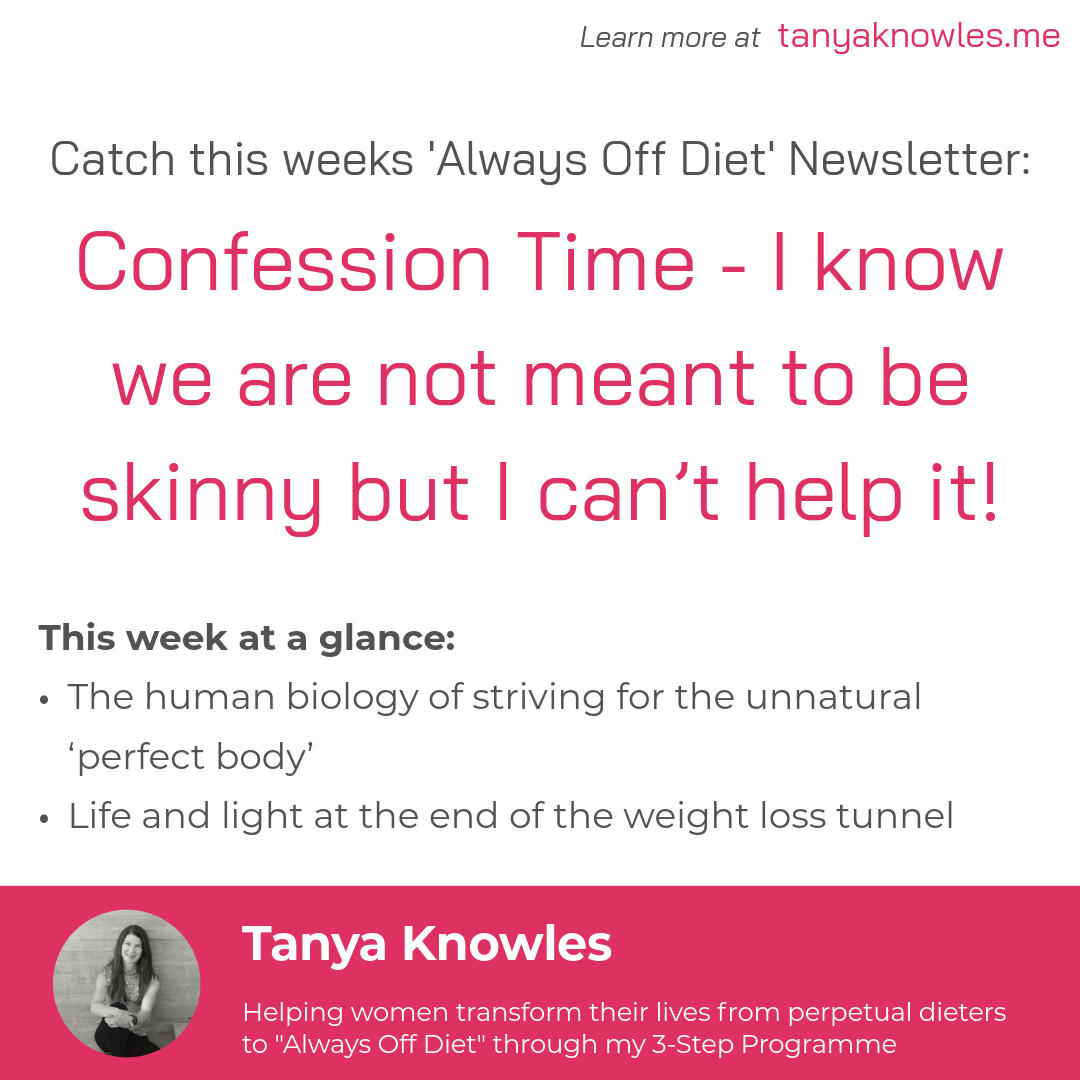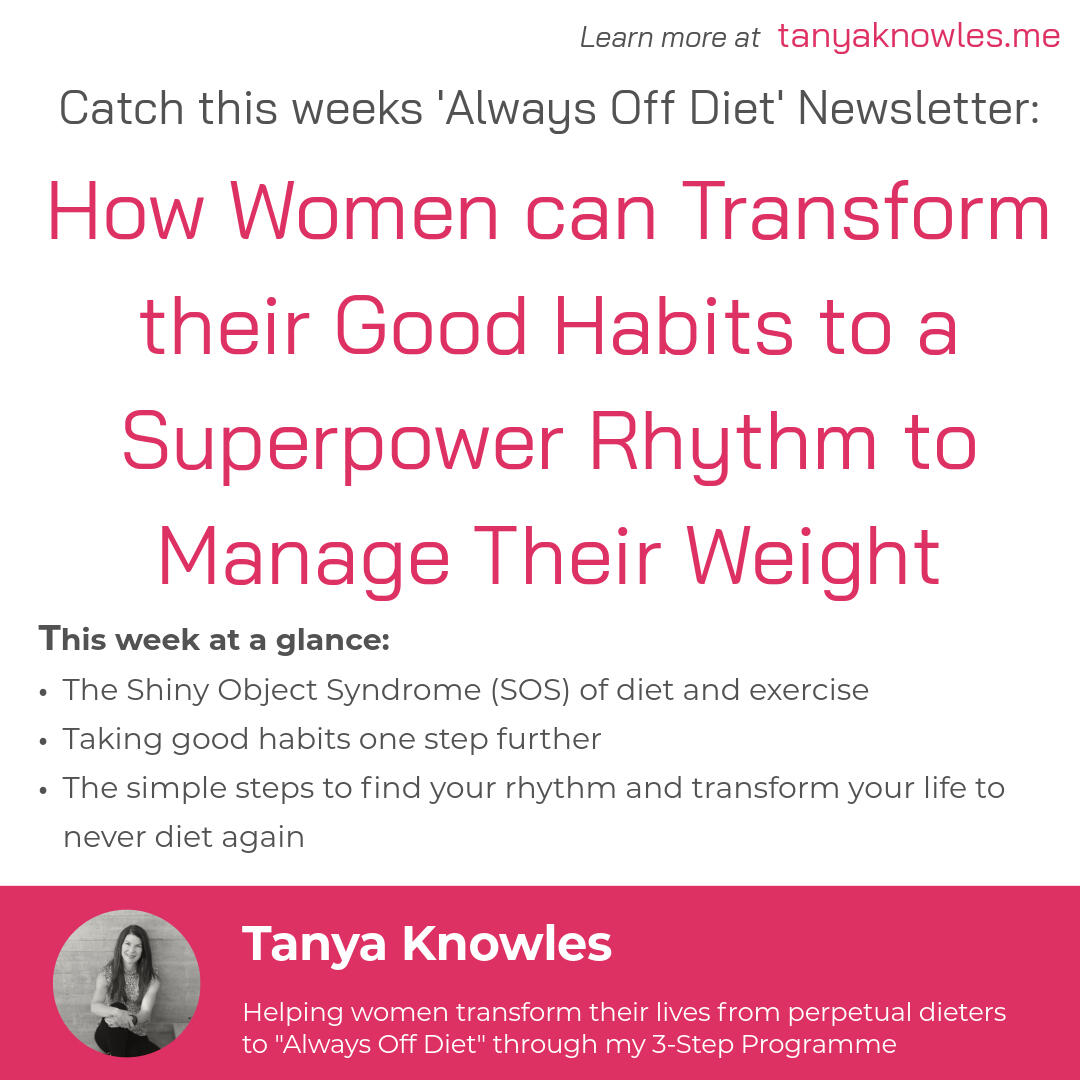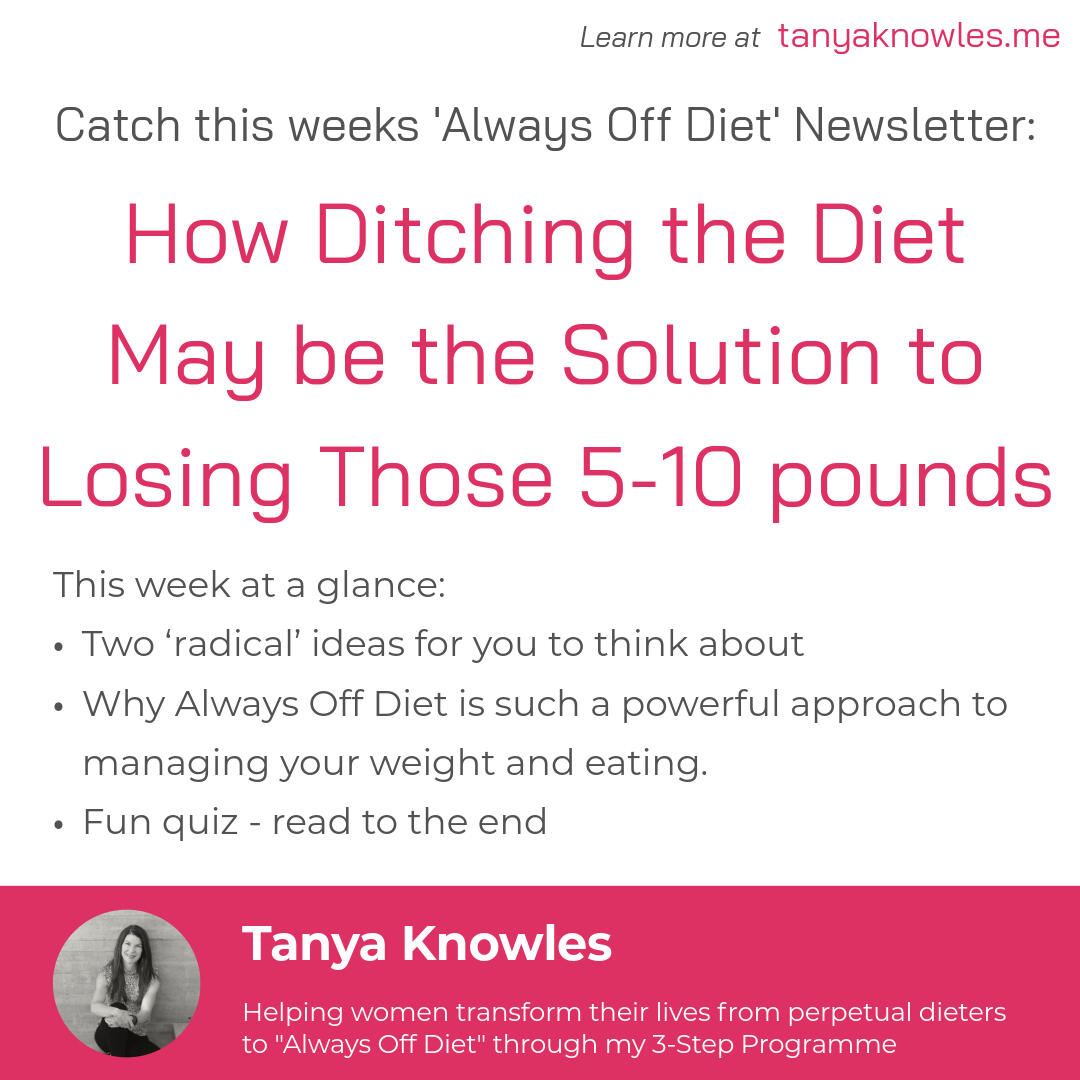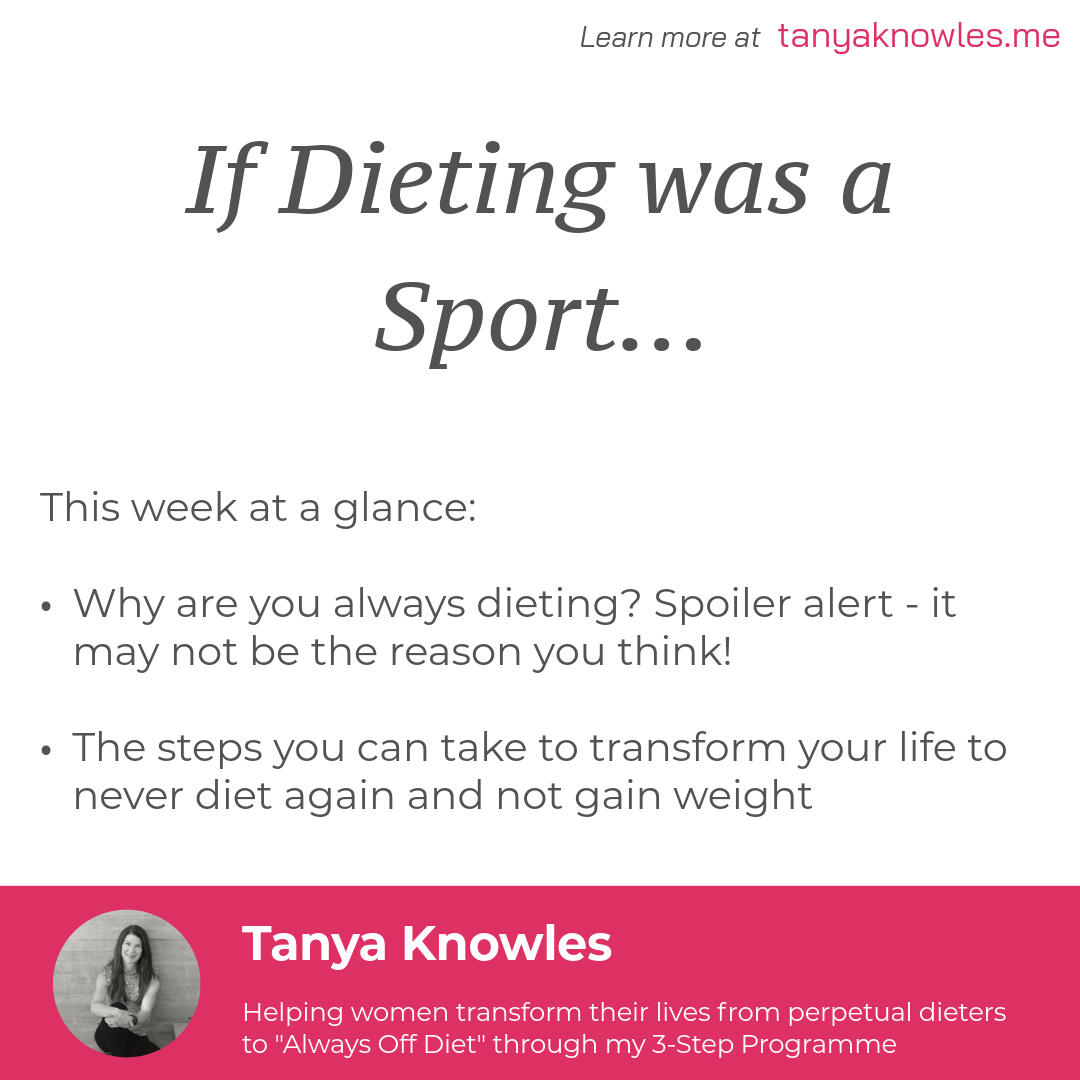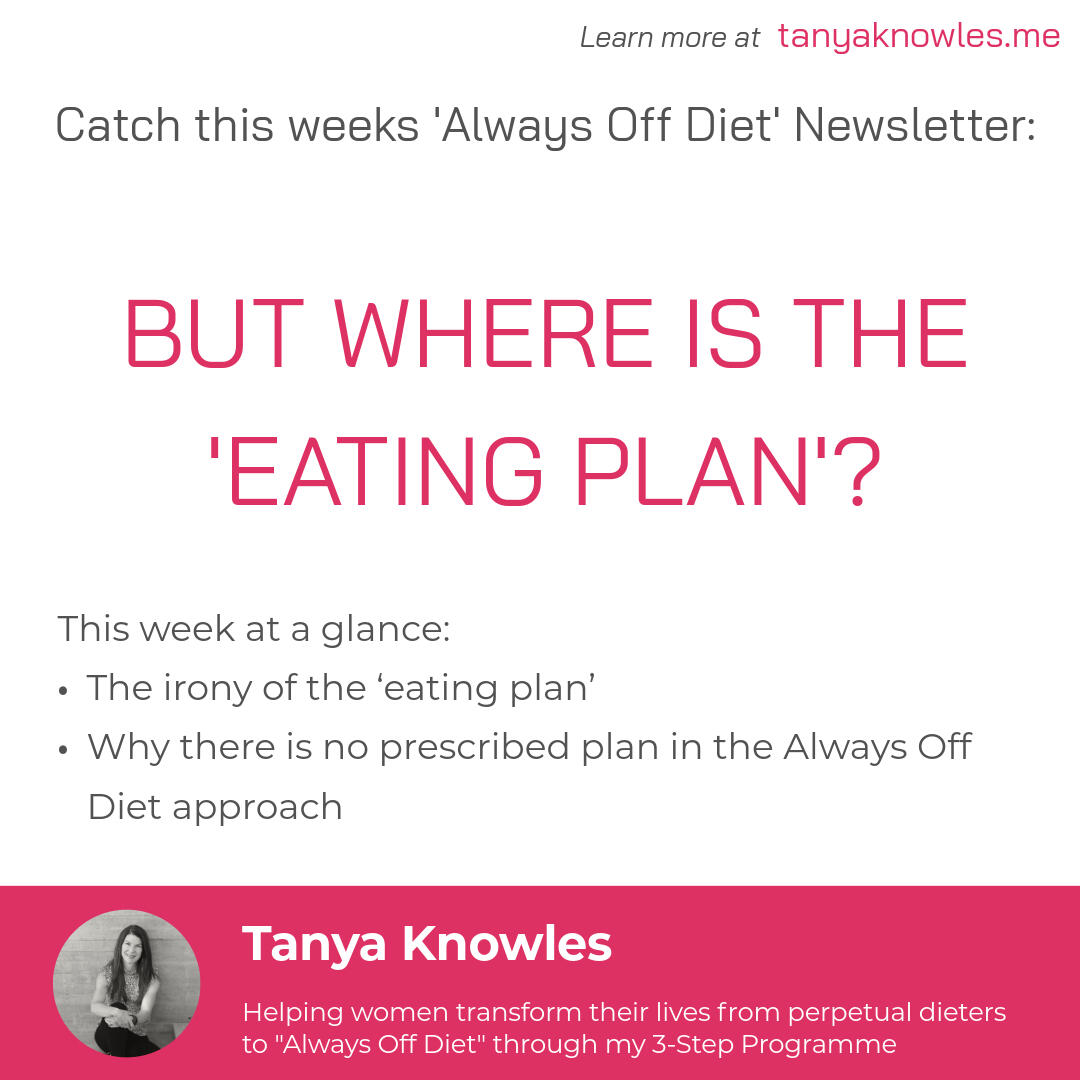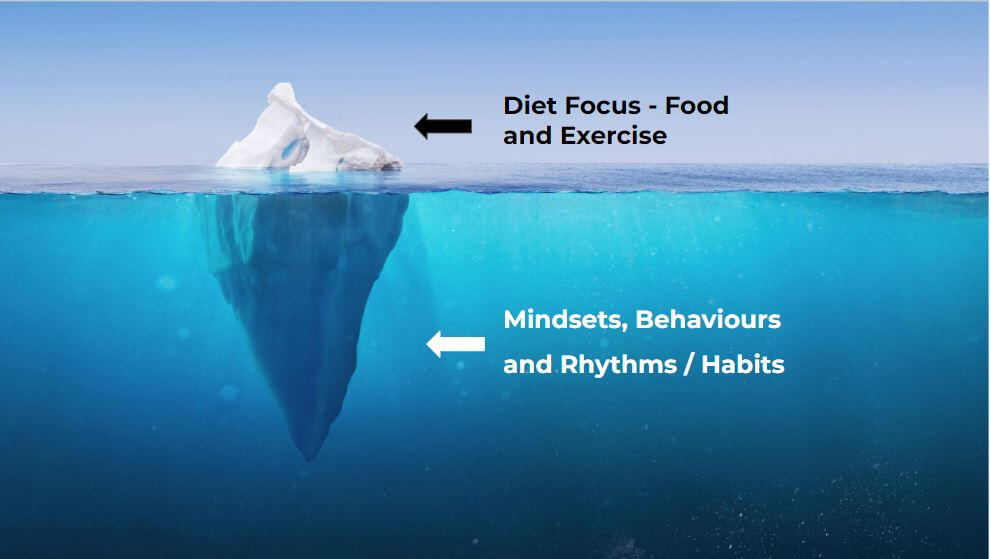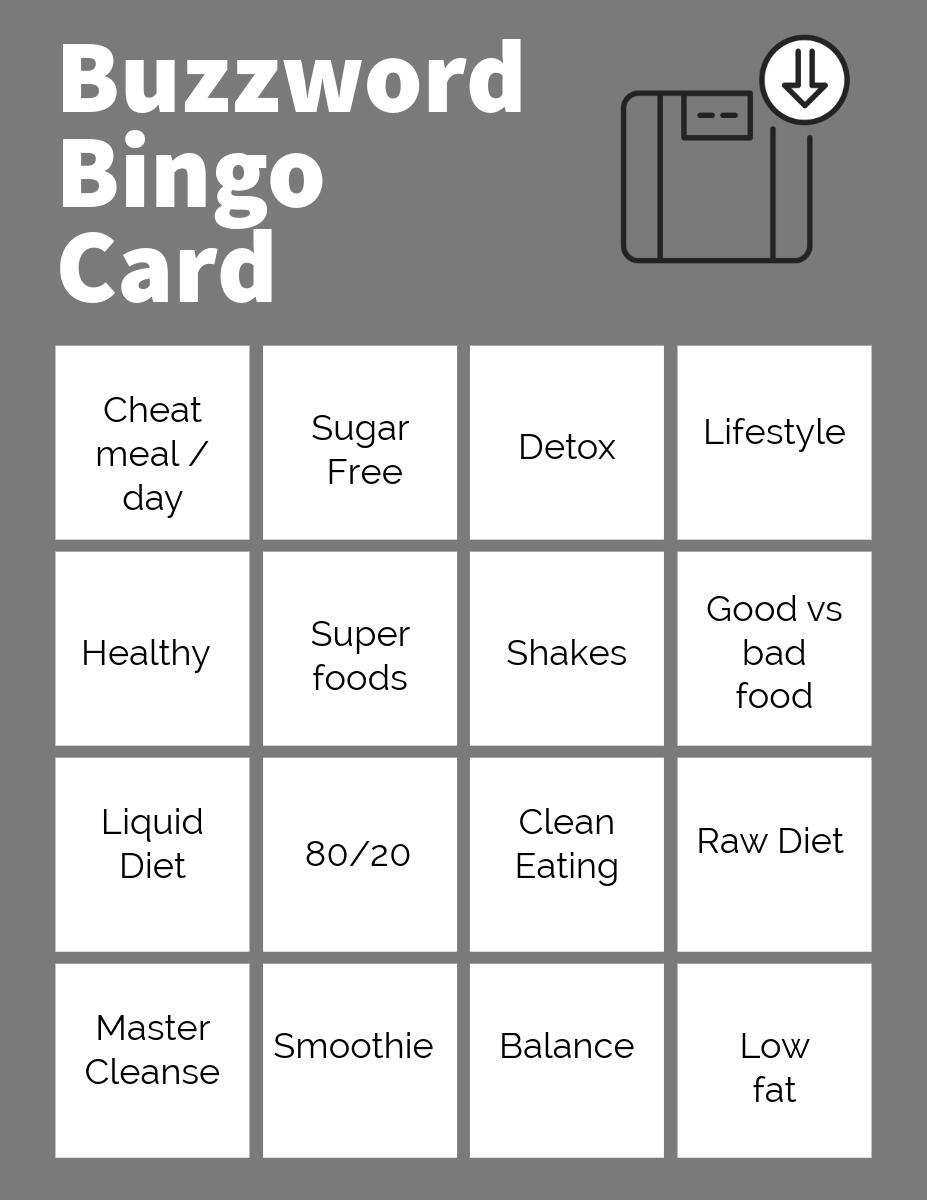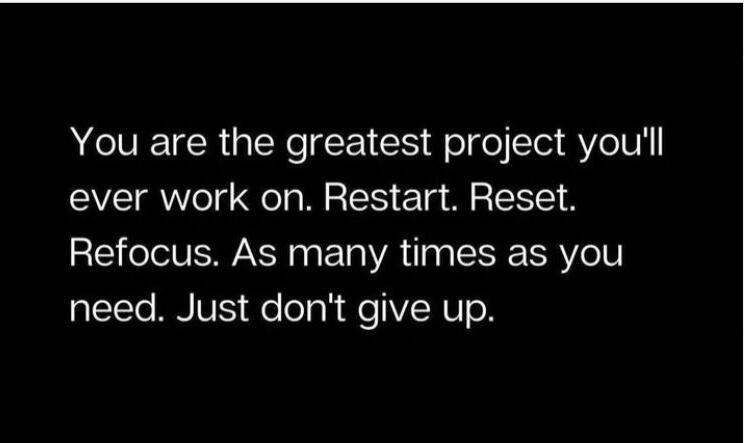Helping women who’ve spent years dieting redefine your relationship with food - so you can quit the all-or-nothing diet cycle and maintain your weight
Find out more
The diet industry has convinced women that the only way to stay slim is through constant dieting. But that’s simply not true.With the Eating Rhythm Formula, I’ve created a simple approach that helps you enjoy the food you love, feel in control, and maintain your preferred weight—without guilt, fear, or deprivation.It’s time to stop the dieting cycle and trust yourself again.Ready to redefine your relationship with food?
Sign up here

Hey there! I’m Tanya Knowles, Founder of the Eating Rhythm Formula and PN1-NC Certified CoachWhen it comes to dieting, I have been around the block more times than I can remember.After 30 years of perpetual dieting to stay slim, I was mentally and emotionally drained from obsessing over food and my body. And so I made the life-changing decision to redefine my mindset and approach to dieting!Since then I have been able to maintain my preferred weight without dieting through the Eating Rhythm Formula.This isn’t another diet plan.It’s for women who feel stuck—starting over every Monday, overeating on weekends, or bouncing from one diet to the next—who are ready to find a program that truly works in real life. Through simple mindset and behavior shifts, you’ll learn how to:- Feel in control around food (yes, even during holidays and nights out!)
- Break free from the self-sabotage loop and all-or-nothing thinking
- Let go of guilt and food obsession
- Create an Eating Rhythm that works with your life—not against itIf you’re exhausted by dieting, overwhelmed by food rules, or craving a saner, more doable approach—this is for you.I would love to hear your story and experiences so please reach out to me via email or Instagram.
Want to join us?
Subscribe to my Newsletter
Every week, I share practical guidance to help you start and thrive on your Eating Rhythm Formula journey
When: Sat, 10 May 2025 @ 2pm sharp
Place: Linksfield, JHB
Space is limited so book now!
A bit more about me...
I started my first diet at the age of 12 years old. Growing up my Mom was constantly on diet and the atmosphere in our household was consumed by her mood as she yoyo dieted from one extreme weight to the next.Into my early 20’s, I had zero confidence in my body with this immense fear that I too would put on weight like my mother. She had been miserable for so many years and I became obsessed with always trying to stay slim. Whilst I never had an eating disorder as such, I was constantly ‘on diet’ with my mind consumed with thoughts about food and my body all the time.Friends used to comment that I was so lucky to be slim or would say I had a fast metabolism. To the outside world, I had no weight problem and would always eat well - only to revert back to some extreme diet the next day again.Then one Monday morning, I hit rock bottom. I was standing in front of the mirror chastising myself for everything I had eaten over the past few days, promising myself that this time will be different. This time I WOULD stick to my diet.And then it hit me - this was the same conversation I would have with myself every Monday morning! In that moment I made a life changing decision. I would ditch the diet and never diet again!I started a journey to find ‘the answer’. From self reflection, reading every diet and psychology book I could find (from “Anti-dieting” to “Intuitive Eating” to “Health at Every Size”), listening to podcasts, analyzing what had worked for me in the past. You name it, I researched it.The end result is that there is no “one answer” - every single person has a different relationship with food and their body.However as I explore my mental and behavioral approach to eating, I did find something that worked for me called The Eating Rhythm Formula.As I shared these ideas with friends, they too started to become more interested and wanted more information about it. And as they say, the rest is history.The Eating Rhythm Formula is not a diet. It’s for those perpetual dieters out there who have spent their lives living in fear of gaining weight and want to quit dieting once and for all.
Join the Movement
Join the movement of women from around the world who have transformed their lives through the 3-step approach from constant dieter to never dieting again
Want to join us?
Struggling to break free from the exhausting cycle of dieting? You’re not alone. The constant 'start over on Monday' mindset and losing control on weekends are holding you back from consistency in your eating habits.I help women over 35 who have spent years dieting redefine their relationship with food, regain control of their eating habits, and create a consistent rhythm that works for real life.
Sign Up Here
Newsletters
Welcome to the Eating Rhythm Formula Newsletter, a weekly newsletter where I provide actionable ideas to help you redefine how you approach dieting through mindset and behavior changes
NEWSLETTER ONE
Welcome to the Always Off Diet Newsletter, a weekly newsletter where I provide actionable ideas to help you ditch the diet as a way to stay slim and love food, yourself and your life.This week at a glance:Why are you always dieting? Spoiler alert - it may not be the reason you think!The steps you can take to transform your life to never diet again and not gain weight
If Dieting was a Sport
If dieting was a sport, I would have turned pro years ago!Those who know my story will know that I had essentially been ‘on diet’ for close to 30 years.Growing up, my mom had struggled with her weight her entire life, going from one extreme diet to another. Her weight yoyo’d from 55kgs (120 pounds) and 100kgs (220 pounds) three times in my lifetime.At one end of the spectrum, I watched her ‘surviving’ on what must have been equivalent to less than 800 calories a day, driving miles to get some weight loss injections, drinking bran mixed with water and half a tomato for ‘lunch’ to the other extreme of eating a giant bags of potato chips and a slab of chocolate while driving me home from school.Needless to say, the atmosphere in our house and my mom’s happiness revolve around the scale. It was so ingrained in us that Mom was either ‘on diet’ or not. But neither extreme was the answer. When she was ‘on diet’ and losing weight she was miserable because she couldn't eat, and when she was not on diet, she was miserable because she was gaining weight. It was a lose lose situation (no pun intended).When I vaguely suggested that I was worried about getting ‘fat’, she did what she thought was best. She put me on a diet.I was 12 years old.Did she mean any harm?Not at all. My mom thought she was helping me.And so my dieting journey began. I spent the next almost 30 years 'on a diet’ just to stay slim. Fortunately I never developed a formal eating disorder and it kept my weight in check but I developed almost as much misery constantly dieting.Hours and hours of my mental, physical and emotional energy was spent obsessed with food, my eating and constantly wanting to lose weight.But why was I CONSTANTLY dieting even though I was never overweight?After much soul searching, I realised it was driven by fear. For me, gaining weight was equated to being unhappy.This leads us to a place where I encourage you to ask yourself WHY are you constantly dieting?Your immediate reaction is probably, “Because I need to lose weight” or “Because I just need to lose 5-10 pounds”But perhaps there is more to it. It may be because you:- Think that society dictates that we need to weigh / look a certain way
- Are keeping your weight in check and stay slim
- Feel it is required by a spouse or family member for love
- Want to fit in as everyone else seems to always be on diet
- Want to be healthy (when taken to an extreme can be negative)
- Think it will make you feel good about yourself and give you confidence
- Are supporting someone you live with who themself may have an issue
- Are rebelling against a family member who always wants you to eat
- Are dealing with a flippant comment from an crazy aunt who once said you were gaining weightThe list goes on …There is no right (or wrong) answer. At the end of the day, we all just want to be loved and accepted. However, if constantly being ‘on diet’ is making you miserable, feeling deprived, holding you back from enjoying social situations, making you obsessed with food etc - it is a good time to understand WHY you are doing it.It is incredible how many women are perpetually dieting but they actually don’t know why. They think it is to lose just 2-5 kgs (4-10 pounds) but if you have been dieting year in and year out, there is more to it. For many of us, it has become such a ‘lifestyle’ that we don’t actually know how to live any other way.I don't advocate having ‘the answer’ but if you are looking for a way to escape diet burnout then consider looking at the 3-Steps in Always Off Diet. The approach may not be for everyone, however if you have spent years being miserable and constantly on diet, it may just be for you.There is no diet jargon, no eating plan, no exercise regime, no before and after photos - it is a mindset and behavioural change to quit dieting, not gain weight and start enjoying life.As you may know, I have just started sharing these ideas and would really appreciate your thoughts on what you like / don’t like about the process. Always Off Diet is starting to help many of my girlfriends and we are dying to spread the word!XXX
Tanyahttps://www.ncbi.nlm.nih.gov/pmc/articles/PMC7344457/
NEWSLETTER TWO
Welcome to the Always Off Diet Newsletter, a weekly newsletter where I provide actionable ideas to help you ditch the diet as a way to stay slim and love food, yourself and your life.This week at a glance:The irony of the eating planWhy there is no prescribed Eating Plan for Always Off Diet
But where is the 'Eating Plan'?
One of the questions I have been asked about Always Off Diet is ‘where is the eating plan?’I hate to tell you this - but there is no plan!Why?Give this some thought for one minute.As women, we are so used to jumping from one diet to the next diet. When we buy a diet book or sign up to a programme, we immediately jump straight to the section with “the eating plan” to see what we can and can't eat.The irony is that eating plans do not work long term. There are over 50 000 books dedicated to diet and health all advocating some form of a plan or food rules, yet we are facing an obesity crisis as we are unable to sustain them.Always Off Diet takes a different approach and here are the 5-simple reasons why there is no eating plan on Always Off Diet:1.) I don’t know what you like to eat. If you eat food prescribed on a list - it is just another diet often wrapped up in disguise2.) I am not qualified as a nutritionist, dietician or food coach. Whilst I have a huge amount of respect for these professions, if their eating plans were the answer, then none of us would have any issues sticking to them3.) You already have the knowledge you need. If you are a seasoned dieter, you already know the basics of calories, getting enough nutrients, your macros etc.4.) There is no ‘one answer’. We are complex beings, what works for some may not work for others. It’s about finding something that works for you5.) The name “Always Off Diet” - we would not be true to our name and it would be hypocritical to advocate not dieting and then prescribe food rules and an eating planHere’s how Always Off Diet actually works (and how you can use it to change your life):Firstly, Always Off Diet is for women who are perpetual dieters who feel like they have spent their lives ‘on diet’ just out of fear of gaining weight or to stay slim - we don’t advocate it to be for everyone.You can follow any approach you like or none at all - it doesn’t matter. If you want to follow Keto, “healthy diet”, high protein, whole foods, vegan etc go for it. What matters is changing your mindset and finding a pattern (we call it a rhythm) to your eating that you can sustain - eating food you love without being ‘on a diet’.If this sounds like some sort of quackery or con, I promise it is not.When you build a pattern to your eating, including holidays, vacations, birthdays and book clubs, you are able to change your mindset around food and be safe in the knowledge that you don’t need to constantly diet AND you won’t gain weight.It’s about finding your rhythm.Check out Step 2 on this website for more information about Finding Your Rhythm - https://tanyaknowles.me/#findyourrhythmUntil next time!XXX
Tanya
NEWSLETTER THREE
Welcome to the Always Off Diet Newsletter, a weekly newsletter where I provide actionable ideas to help you ditch the diet as a way to stay slim and love food, yourself and your life.This week at a glance:- Two ‘radical’ ideas for you to think about
-Why Always Off Diet is such a powerful approach to managing your weight and eating
- Fun quiz - read to the end
How Ditching the Diet May be the Solution to Losing Those 5-10 pounds
Before you go on another diet / detox / fast to lose the weight, think about these 3 questions:* How many times have you started a diet? 30, 40, 50, 100 times?
* How long have you wanted, and tried, to lose just 5-10 pounds? 5, 10, 20 years?
* How many different diets have you tried? 5,10,20?We have all heard “The definition of insanity is doing the same thing over and over again and expecting a different result”As women we have brainwashed ourselves into constantly thinking that we need to lose weight. Throw a bunch of women together and see how quickly we start talking about some new diet, an eating plan we are trying, how much weight we have gained, how ‘bad’ or fattening some food is or just the flippant comments like ‘Oh, I shouldn’t / can’t eat that” etc.We have normalised that we have to be 'on diet' or be following some eating plan all the time. Women jump from one diet to the next and the next.For many of us who have managed to reach our ‘goal weight’, we find that we are still not satisfied, and very often start shifting the goalposts even lower on the scale.It makes for a long term, miserable existence and you don't have to live like that.So how do we stop the insanity cycle?I want to plant the seed of two ‘radical’ ideas….* Maybe you need to stop trying to lose weight
* Maybe if you stopped the dieting cycle, the weight would slowly come off by itselfYou may not be at your ‘goal weight’ but if you have been perpetually dieting for years and years to lose that weight and it is not working, maybe it’s time for a new approach.But how?Firstly, reframe the way you are thinking about losing weight by calling a truce on dieting.I know what you are thinking: “There is no way I can do that. If I stop dieting, I will lose control and gain weight!”As renowned psychologist Carl Jung contended “What you resist not only
persists, but will grow in size.”So not necessarily! Always Off Diet gives you the exact tools you need to build an eating routine / rhythm so that you can maintain your weight and never feel like you are on diet ever again.Secondly, think back to a time in your life when your diet / eating just seemed ‘to work’ and you felt in control. I will bet you that there was some sort of regular routine to your day! It forced you into an eating and lifestyle pattern that just made things seem easy. It could have been working at a particular job that accommodated a set time each day to eat, or postnatal slotting in with your baby's routine, or just a change of environment.The point is, as soon as we can establish a regular routine around what and when we eat, it makes things so much easier.The key is to decide what YOU like to eat and then decide WHEN you will eat it. There is a step by step guide with great tips on my website on exactly how to do this. https://tanyaknowles.me/#findyourrhythmWhy is this approach by Always Off Diet SO powerful?* You choose food you love to eat!
* So it never feels like you are on a diet.
* You eliminate decision making and agonizing over what to eat - this just makes you think more about food. Think about Steve Jobs, he wore the same type of clothes everyday (black jeans and a black polo-neck). It was one less daily decision that he needed to make and think about.
* You stop thinking about and obsessing over food all the time.
* You look forward to every meal and can’t wait to tuck in because you have chosen the ‘menu’ upfront.
* It becomes second nature - where you don’t even think about it. Like brushing your teeth - but more enjoyable.
* You can have the chocolate, the latte, the drink - when you build it into your daily rhythm, you don’t feel deprived and start the binge diet cycle.
* It saves you precious time and convenience as you know exactly what and when you are eating and can prepare in advance if needed.Some women feel overwhelmed and stuck on how to get started. Here are some great examples of routines (I like to call them rhythms) that women who want to try Always Off Diet can follow:* The High Protein Gal Rhythm
* The intermittent fasting rhythm
* The chocoholic rhythm
* The coffee addict rhythm
* The snacker rhythm
* The office worker rhythmIf you would like some ideas on exactly how they work, reachout to me.As I have said before, Always Off Diet is just an idea I have that has changed my life and worked for me. I am not selling anything and want to chat to women to see if I can help them too.Have a great week all!XXX
TanyaPS Did you know that there are over 50 000 books written about dieting (you would think we would have found the answer by now…!) So here is a fun quiz for you. It’s like the app with a map of the world where you can show how well travelled you are by ticking off countries. Well let’s see how diet savvy you are by ticking off how many diets you have tried?
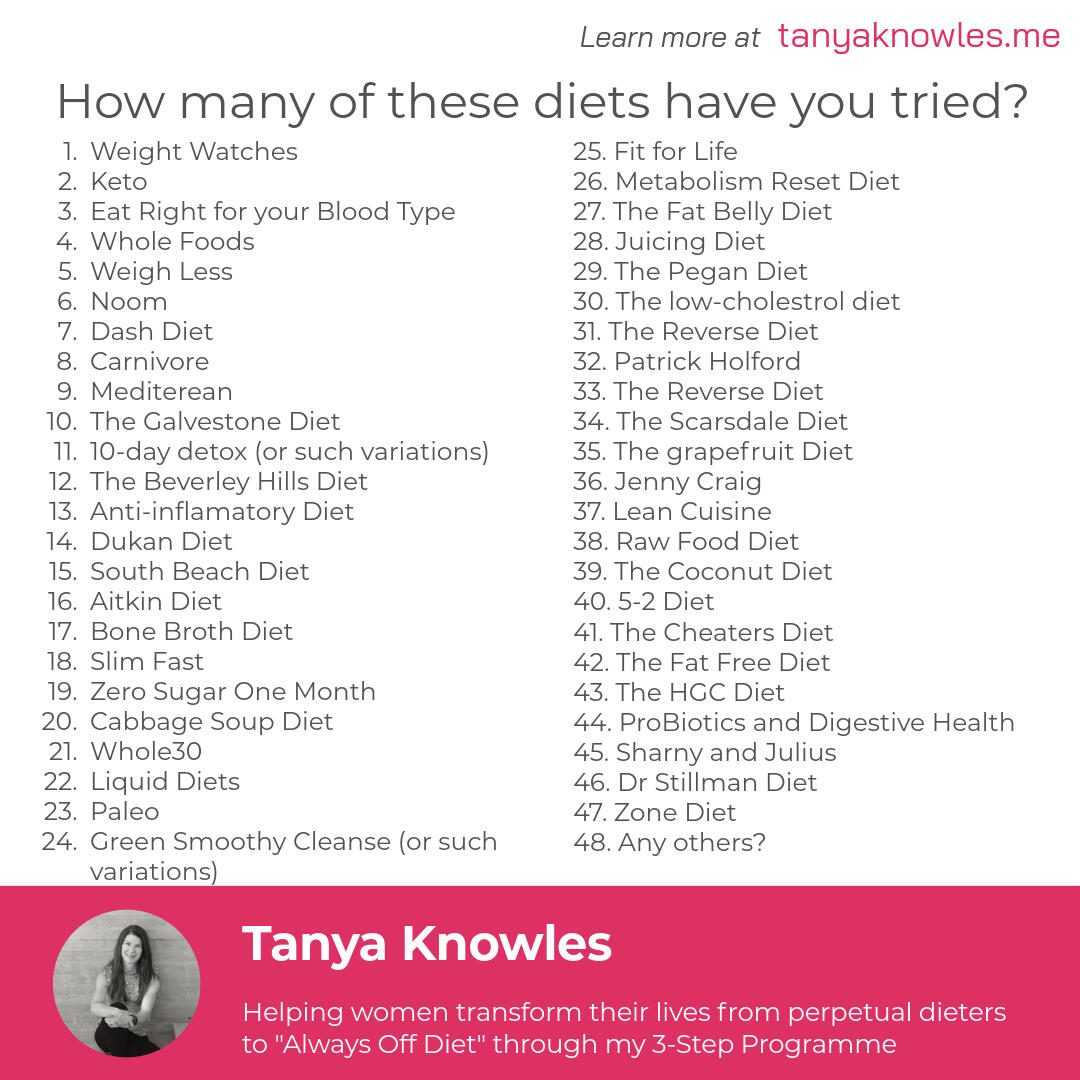
NEWSLETTER FOUR
Welcome to the Always Off Diet Newsletter, a weekly newsletter where I provide actionable ideas to help you ditch the diet as a way to stay slim and love food, yourself and your life.This week at a glance:- The Shiny Object Syndrome (SOS) of diet and exercise
- Taking good habits one step further
- The simple steps to find your rhythm and transform your life to never diet again
How Women can Transform their Good Habits to a Superpower Rhythm to Manage Their Weight
Are you a creature of habit?If so, this can be both a powerful and destructive trait in terms of your diet and relationship with food.Many of us go through phases in life where we find something new to try. We decide, this is it and go all in! It’s the shiny object syndrome (SOS - a continual state of distraction brought on by an ongoing belief that there is something new worth pursuing).Diet or exercise programmes are typical examples. We buy all the equipment, food for the eating programme, pay the membership, buy the clothing or shoes we need (in every colour of course!), get the supplements, shakes, books, plan the meals etc.With some early stage enthusiasm and self motivation, we go full steam ahead and follow the programme to the tee. With some luck, we see some results and life seems great!Sounds good? Right?The challenge for many of us, is that we can only keep this going for so long.There are normally two things that happen:1.) The novelty wears off, motivation fades, results slow down and we lose interest - often looking for some shiny alternative2.) LIFE - we move house, have a bad day, start a new job and we can't keep the momentum goingSome would argue that instead, the key to success is rather to build good, long term, sustainable habits. Habits are proven to be extremely important and powerful.James Clear’s book, Atomic Habits, has to be the best read on the topic. He refers to habits as:* Small actions you perform daily
* A regular routine or behaviour that is performed regularly, and often automatically
* Have a positive (or negative) compounding effect
* Can determine the difference between who you are and who you could be
* Bad habits often provide an instant reward / gratification whereas with good habits, the rewards and gratification are delayedAtomic Habits provides a great foundation for many aspects of life with some practical tips on how to build good habits and get rid of bad ones.“Success is the product of daily habits - not once in a lifetime transformations,” James Clear, Atomic HabitsStemming from the popularity of the book, the concept of ‘habits’ has become very trendy and popular, particularly in diet and exercise circles. Influencers spout everything from following healthy eating habits to building results through sustainable habits or habitually tracking calories, macronutrients and steps.However, as transformative as good habits can be, life is not so simple - especially when it comes to diet and exercise.It is all good and well to say that we must get into the habit of eating healthy food and exercising, but if it was so simple, none of us would have an issue. The reality is that we are surrounded by highly palatable food, travel for business, fall ill with flu, have special occasions, go on vacation, go through a break-up, spend weekends socialising etc.Maintaining habits day in and day out is hard!Life is not constant.As soon as we are thrown off being routine, it becomes very difficult to maintain these habits (no matter how big or small) and we take 10 steps backwards.To add to this, as humans (especially seasoned dieters), we also have an all or nothing mentality where we are either ‘on diet / track’ and following our healthy eating and exercise habits or the wheels have fallen off and we are binge watching netflix with a slab of chocolate for company.So what can we do instead? How can we leverage off our good habits when life happens? How can we keep the momentum going?I call it finding your rhythm. It’s about taking your eating (and exercise if you wish) habits one step further to thrive and break the ‘latest fad’ / all or nothing cycle.As opposed to only focusing on your habits, you rather carve out rhythms which depend on your day and circumstances.The power and sustainability of such an approach, means that even when life throws you lemons, you can still make lemonade because of a change in mindset.There are three very simple steps to kick this process off for yourself:Step 1:Analyse your week / month / year and get an idea of the patterns you are able to follow.Examples may be:
- Monday - Friday is the same pattern, weekends are different
- Once a month, you have a set social engagement, business travel etc
- X week is your menstrual cycle which requires more TLC
- November / December is the silly season and that requires a different approach to manageOnce you have a clear idea of your various patterns, move onto step 2.Step 2:I used to be too scared to tell people about Step 2 as I worried they would not like the idea or think they can’t do it, but I promise this is the kicker and most powerful and important step! It’s about deciding what and when to eat.- Decide on an eating plan made up of the SAME meals and snacks you can eat everyday at the same time - call this your daily rhythm
- The biggest difference between this approach and dieting is that the food you choose MUST be food you love and enjoy (as much as you think you love pizza, you probably cannot eat one every single day for lunch for 7 days in a row)
- Make sure you are getting in a balance of all your macronutrients (Protein, carbs and fats) and be realistic about how much you will eat everyday.
- Eat those meals and snacks at the same time everyday (give or take 30 mins)Yes it sounds boring to be eating the same thing every day but when you have made the decision based on eating food you love, you will embrace and enjoy it so much more. And it is much better than being on a diet!The meals can align with what you want to achieve for your health and your body.For example, below is roughly MY daily and weekly rhythm. I like to prioritise protein to support my weight training, I have a Monday to Friday job, and I want flexibility on the weekends
PLEASE NOTE: This is NOT a diet or eating plan but just an example of a Rhythm.
It is only to demonstrate the mindset and approach of eating the same things at the same time to build a rhythm.
Please refer a great article via this link called "But where is the Eating Plan?" as to why there is no diet / eating plan with Always Off Diet
| Time | Monday | Tuesday | Wednesday | Thursday | Friday | Saturday | Sunday |
|---|---|---|---|---|---|---|---|
| 8am | Cafe Latte & Protein Loaded Smoothie (Chocolate) | Cafe Latte & Protein Loaded Smoothie (Strawberry) | Cafe Latte & Protein Loaded Smoothie (Vanilla) | Cafe Latte & Protein Loaded Smoothie (Caramel) | Cafe Latte & Protein Loaded Smoothie (Chocolate) | Cafe Latte & Protein Loaded Smoothie (Strawberry) | Cafe Latte & Protein Loaded Smoothie (Vanilla) |
| 10am | Coffee | Coffee | Coffee | Coffee | Coffee | Flexi breakfast | Flexi Brunch out |
| 11am | Boiled Eggs on Rye Toast with Tomato and Avo | Boiled Eggs on Rye Toast with Tomato and Avo | Boiled Eggs on Rye Toast with Tomato and Avo | Boiled Eggs on Rye Toast with Tomato and Avo | Boiled Eggs on Rye Toast with Tomato and Avo | ||
| 4pm | Protein Bar and Tea | Protein Bar and Tea | Protein Bar and Tea | Protein Bar and Tea | Protein Bar and Tea | Snack | Late family Sunday lunch |
| 6.30pm | Protein and Veg / Salad (Fish) | Protein and Veg / Salad (Chicken) | Protein and Veg (Red meat) | Protein and Veg / Salad (Fish) | Takeout | Dinner out at a restaurant or host guests at home (incl dessert) | |
| 8pm | Tea and Biscuits | Tea and Biscuits | Tea and Biscuits | Tea and Biscuits | Tea and Biscuits |
I also recognise that I need some flexibility for a midweek evening out, monthly book club, my menstrual cycle etc but the key thing is to return to your daily rhythm as soon and as often as you can.You have to devise something that works for you. You may be a chocoholic (I am a biscuit girl) and want a chocolate each evening, or include a glass of wine. It doesn’t matter - do what works for you!This is not an eating plan handed down by a dietician or nutritionist. Instead you are empowered to make the choice about what and when you eat so you don’t feel like you are on diet.We touched on why the rhythm approach is so powerful in a previous newsletter and here is a recap:- You choose food you love to eat! So it never feels like you are on a diet.
- You eliminate decision making and agonizing over what to eat - this just makes you think more about food. Think about Steve Jobs, he wore the same type of clothes everyday (jeans and a black polo neck). It was one less daily decision that he needed to make and think about.
- You stop thinking about and obsessing over food all the time.
- You look forward to every meal and can’t wait to tuck in because you have chosen food you like upfront.
- It becomes second nature - where you don’t even think about it. Like brushing your teeth - but more enjoyable
- You can have the chocolate, the latte, the drink - when you build it into your daily rhythm, you don’t feel deprived and start the binge diet cycle.
- It saves you precious time and convenience as you know exactly what and when you are eating and can prepare in advance if needed.If you have found this newsletter helpful, reach out and let me know. Spread the word and have a great weekXXX
Tanya
NEWSLETTER FIVE
Welcome to the Always Off Diet Newsletter, a weekly newsletter where I provide actionable ideas to help you ditch the diet as a way to stay slim and love food, yourself and your life.This week at a glance:- The human biology of striving for the unnatural ‘perfect body’
- Life and light at the end of the weight loss tunnel
Confession Time - I know we are not meant to be skinny (but I can’t help it)!
We are not meant to be skinny - there I said it.For the Anti-Diet, Intuitive Eating, Health at Every Size (HAES) advocated, you are right. Women are probably naturally meant to carry more weight than what western ideals of the ‘perfect body’ portray.The power of conforming to societal norms shapes many aspects of our lives. I am no stranger to this. I left school, went to university, found a job at a bank, bought a house, climbed the corporate ladder, got happily married, had two kids and (drum roll please) …. dieted for 30+ years to try and keep my body aligned to western ideals for a woman in the 21st Century.My life was made up of a series of dieting and exercise regimes. Some extreme and some not. From Weight Watchers to detoxes, banting to the grapefruit diet, 7-days a week in the gym to years of pilates and walking. The scale, being ‘on diet’ and my weight, consumed me. No matter what I did and how ‘good’ I was, the underlying thread was always the same. Unhappy with my weight and body as it was not ‘perfect’.You may ask why? How can we spend 30+ years striving for an unnatural ideal primarily just based on what society expects?The simple fact is that humans are biologically driven to connect with others. We cannot help but want to be loved and accepted by a community and company we keep. Even people who advocate that they "don't care what other people think", often do care that others in their tribe perceive them in a certain light as "different" in that regard.So, back to the question of weight. What are we meant to weigh based on our body type? Agree or disagree, overall we are probably not naturally meant to be as skinny as many of us aspire to be.I am definitely not here to convince you to ‘let nature take its course’. I perceive the Anti-Diet, Intuitive Eating, Health at Every Size (HAES) movements as incredibly admirable to confront societal pressures and diet culture head on.But they are not for me. I will confess that wanting to be ‘thin’ is so ingrained in me, I can’t begin to contemplate any other way of life for myself. It is my choice - struggles and all.As a classical byproduct of some of these dieting societal pressures, I am on a mission to help women balance keeping their ‘perfect body ideals’ (whatever that may be) with a way of eating that stops the insanity of the yo-yo dieting and exercise cycle.There is no miraculous weight loss hack or new exercise regime to give you an instant six pack. Just some basic behavioural and mindset changes that just make the whole thing one hell of a lot easier.For the first time in 30 years, I am able to eat food everyday that I genuinely love, without obsessing and agonising over every food decision that I make. There is a level of control over my eating, giving me one less thing to worry about, which allows me to enjoy life that just one bit more. The dread of going on vacation because I knew it meant going on an extreme diet before (to get ready) and after (to recover from everything I ate) is gone. I finally look forward to Monday, to get into my eating rhythm. And yes, although it’s not perfect, I do have more confidence in my body than I ever have before. Just from changing my approach and mindset.Do I get it right everyday? NoIs it a journey? YesDo I believe it can transform your life away from perpetual dieting? AbsolutelyI would love your feedback on the Always Off Diet approach (both positive and negative)! There are some great insights on my website and in previous newsletters on how to get started.As many readers know, I am not selling anything but wanting to validate this concept and idea to help women around the world. Drop me a quick note with feedback - it would mean a lot.Until next time.XXX
Tanya
NEWSLETTER SIX
Welcome to the Always Off Diet Newsletter, a weekly newsletter where I provide actionable ideas to help you ditch the diet as a way to stay slim and love food, yourself and your life.This week at a glance:- The impact of your peers on weight loss & exercise
- How to design your environment and the people you hang out
with to the person and lifestyle you aspire to live
Unforgettable Wisdom My Mother Left Behind
Readers who know me well, will know that my Mother taught kindergarten for 25+ years. Each time a child came to her and said “Johnny hurt me” or “Fred was mean to me”, her automatic response was “Go and find nicer friends”.Modern day parenting coaches might not quite agree with this approach but there was a very powerful underlying message here.We need to be very selective about the company we keep.Why?Studies show that the people we hang out with impact the outcome of our lives more than we realise and or give credit for.It goes back to the classic nature (genes) versus nurture (environment) debate. You can have two children who grow up in the exact same household under the same parenting style yet they can turn out with vastly different outcomes in their lives.In a very interesting book called The Nurture Assumption by Judith Rich Harris, Harris contends that although children do learn things from their parents / home environment, they learn far more and are shaped by their peers.Childrens’ peers and social groups influence their behaviours, opinions, goals, values, and language and determine the sort of people they will be when they grow up.In many ways we are no different when it comes to our diets, bodies and exercise.“Your diet is not only what you eat, it’s what you watch, what you listen to, what you read, the people you hang around. Be mindful of the things you put in your body emotionally, spiritually and physically” UnknownIt works both ways.If your spouse defaults to KFC takeout when it's their turn to cook, regularly works their way through a tray of chocolates while watching Netflix with you and aspires to vacation lounging for hours on end on a sunlounger sipping pina coladas, one can say it will be tough for you to not fall in line.Another classic example of peer and environment influence is for all the Crossfitters out there. Joining a Crossfit Box can start out as a way to get fit and strong but it becomes so much more. Members often gain a sense of belonging and community. They may even start to wear similar workout clothing, buy the same brand of shoes, use the same protein powders and develop their own crossfit language banter.

The examples are endless. For instance, drug addicts may need to break away completely from their social circle and environment to become clean. Or for people starting a job, one can quickly slip into behaving according to the organization's culture, dressing the part and using new fancy acronyms unheard of anywhere else.So how can we use this to our advantage?The more you are able to design your environment and the people you hang out with to the person and lifestyle you aspire to live and be, the easier it becomes.Without ditching your husband because he buys KFC, here are some practical steps you can take:
Briefly reflect on your own life and identify how and when your life has been shaped by peers around you. (This can be both positive and negative). This will heighten your awareness about the company you keep.
“You are the average of the 5 people you hang around most”. Focus on spending time with people you aspire to be like and fuel your energy for life. Try and eliminate those that don’t.
Assess if your friends or family enable your vices. Talk to them to decrease the friction it may be creating in your environment.
Determine what habits or rituals your family follows that are both positive and negative. Can you double down on the positive ones and try to minimize the negative ones?
Discover different ways to socialise that are not just focused on (over) eating and drinking (e.g. bond with girlfriends by going for a walk around the neighbourhood followed by the usual coffee catch up afterwards)
The result of a change in your relationships or the people you associate with can significantly alter your life and behaviour. Hanging out with amazing, supportive people who inspire you to be better and support the lifestyle and values that you aspire to can only make you the person you want to be.Moral of the story? Find nicer friends.XXX
TanyaPS I personally don’t do Crossfit but love all my friends out there that do
(Hi Crossfitters 😀)!
If you enjoy these newsletters, sign up here to receive them straight to your inbox
NEWSLETTER SEVEN
Welcome to the Always Off Diet Newsletter, a weekly newsletter where I provide actionable ideas to help you ditch the diet as a way to stay slim and love food, yourself and your life.This week at a glance:
Learn how a simple change can turn your travels into rejuvenating
experiences that leave you energized and guilt-free
Discover the One Secret to Redefine how You Travel and Still Achieve your Exercise Goals
Do you own one of those pairs of shoes?You know the ones.The trusty pair of sneakers you take on weekends away, vacations, business trips etc with the intent of exercising but never get around to it.aka - “the most well travelled pair of shoes never to leave the suitcase”Prior to leaving, you have good intentions. You plan to hit the hotel gym, go for a run on the beach or try your hand at sunrise yoga.Then real life happens. You arrive at your destination tired and jetlagged from travelling. Sleep is calling your name and so you promise yourself that you will start tomorrow. Tomorrow comes and it doesn't happen. The days slip away and your trusty sneakers return home never having left the suitcase.To compound the situation, when you are away from home, you tend to eat more food than usual. Something that is totally normal and makes sense. There is an abundance of new delicious things to try and food is very much part of the fun and experience.However, the problem many of us face is that we return home feeling guilty and worse than before we left. What was an enjoyable time away turns into a post vacation hangover that literally and mentally weighs you down.So how can you turn this around?Whilst you don’t need to treat your trip as an exercise bootcamp, there is one secret to breaking the dreaded ‘sneaker suitcase’ ritual:Just do it on the first day.Whatever exercise you intend to do, just break out the sneakers on the first day and do it.Find out where the gym is as you arrive, research running routes or ask about the yoga class times.If you can get going on day one, it sets the tone for your entire trip. It's the toughest day to kick into action but when you do it, this goes a long way to motivate you to keep going and enjoy your time away guilt free.You will return home having accomplished something and may even be inspired to keep the momentum going on your return and build a new habit.So next time you travel, pack those trusty sneakers and give them a spin. You will be surprised with the result.XXX
Tanya
If you enjoy these newsletters, sign up here to receive them straight to your inbox
NEWSLETTER EIGHT
Welcome to the Always Off Diet Newsletter, for weekly insights to help you effortlessly maintain your preferred weight without dieting. You can gain control of your eating through uncomplicated mindset, behavior and rhythm changes.
Best ‘Diet’ Hacks for Real Progress - From Perfect to Imperfect
For those of you who have ever read the Mr Men book series, you will have heard all about Nonsense Land, Clever Land and Loud Land. In a great article by Dickie Bush he talks about “Once Land”.It’s a place where people have the mindset of if X could happen, then I can Y.
Once I lose just 5-10 pounds, then I will be happy
Once the holidays are over, then I will start my diet
Once work settles down, then I will have more time
Once the weekend is over, then I will be ‘good’ on Monday
Once the kids are back at school, then I will get back into routine
This is one of the biggest downfalls of seasoned dieters. Living in ‘Once Land’. Crippled by waiting for the ‘perfect moment’ is actually what prevents you from incrementally building any sustainable long term change to achieve your goals. Instead you are in this start stop state like an endless game of tug of war.These ‘perfect moments’ are few and far between. And when they do arrive, they don’t last very long. Life gets in the way.So what should we be doing instead?It’s called imperfect action.Popularised by the 33rd President of the US, Harry Truman, the term “imperfect action” is a far more effective, sustainable and realistic approach.Instead of living in Once Land, it’s about starting exactly where you are (warts and all), with the resources that you have at that moment in time.Imperfect action is all about:
Taking action, even small and imperfect, and not quitting when things get hard;
‘Falling off the rails’ but having the ability to quickly climb back on; and
Making mistakes, slipping up and still pushing through.
From a practical standpoint, here are the best ways to think about this in terms of easily maintaining your preferred weight.1.) Think in hours and days - not weeks and monthsWe throw in the towel for whole weeks / months at a time waiting for Monday to come or January to roll around so that we can start afresh. Vowing that this time things will be different. We make the fatal mistake thinking that this time we will be ‘good’. This time we will stick to our diet. In reality, we make a ‘mistake’, fall off the rails and then need to wait for Monday to start again.How about thinking in hours and days? If you over indulge on a meal, enjoy it! The secret is to just get back into your routine at the next meal or day (regardless of the day of the week).2.) Think small - not bigSmall actions are far better and more sustainable than big ones. If you want to walk 10 000 steps a day, you are going to get caught up into thinking you need to change into your workout gear, put your sneakers on, find time to shower afterwards etc.Rather take action in small bites. You can easily walk 2000-3000 steps without any pre and post workout baggage and time. Think about it. How often have you walked around a shopping centre or high street in your sandals / boots (even wedges!) and managed to rack up 5000 steps without building up a sweat in your gym gear?By taking small actions a couple of times a day the 10 000 steps will build up on their own.3.) Think Rhythm - not habitsHabits are amazing! Habits are powerful! Habits are life changing!BUT habits are small actions you perform every day. And every day is not the same. Life is not constant. It is hard to maintain the same actions all the time.Therefore rather think in rhythms. Identify patterns in your days, weekends, months etc where you adapt to your circumstances.You may be able to be more consistent with your eating from Monday to Friday but need a different rhythm and plan for weekends. Vacations may throw you off - so come up with a realistic approach to still embrace and enjoy them without returning home feeling like a guilty beached whale. Your menstrual cycle might wreck havoc with your emotions - recognise this and determine realistically what small actions you are capable of, even on your worst days.Step out of Once Land and remember Harry Truman - “Imperfect action is better than perfect inaction.”Until next timeXXX
Tanya
From a practical standpoint, here are the best ways to think about this in terms of easily maintaining your preferred weight.1.) Think in hours and days - not weeks and monthsWe throw in the towel for whole weeks / months at a time waiting for Monday to come or January to roll around so that we can start afresh. Vowing that this time things will be different. We make the fatal mistake thinking that this time we will be ‘good’. This time we will stick to our diet. In reality, we make a ‘mistake’, fall off the rails and then need to wait for Monday to start again.How about thinking in hours and days? If you over indulge on a meal, enjoy it! The secret is to just get back into your routine at the next meal or day (regardless of the day of the week).2.) Think small - not bigSmall actions are far better and more sustainable than big ones. If you want to walk 10 000 steps a day, you are going to get caught up into thinking you need to change into your workout gear, put your sneakers on, find time to shower afterwards etc.Rather take action in small bites. You can easily walk 2000-3000 steps without any pre and post workout baggage and time. Think about it. How often have you walked around a shopping centre or high street in your sandals / boots (even wedges!) and managed to rack up 5000 steps without building up a sweat in your gym gear?By taking small actions a couple of times a day the 10 000 steps will build up on their own.3.) Think Rhythm - not habitsHabits are amazing! Habits are powerful! Habits are life changing!BUT habits are small actions you perform every day. And every day is not the same. Life is not constant. It is hard to maintain the same actions all the time.Therefore rather think in rhythms. Identify patterns in your days, weekends, months etc where you adapt to your circumstances.You may be able to be more consistent with your eating from Monday to Friday but need a different rhythm and plan for weekends. Vacations may throw you off - so come up with a realistic approach to still embrace and enjoy them without returning home feeling like a guilty beached whale. Your menstrual cycle might wreck havoc with your emotions - recognise this and determine realistically what small actions you are capable of, even on your worst days.Step out of Once Land and remember Harry Truman - “Imperfect action is better than perfect inaction.”Until next timeXXX
Tanya
If you enjoy these newsletters, sign up here to receive them straight to your inbox
NEWSLETTER NINE
Welcome to the Always Off Diet Newsletter, for weekly insights to help you effortlessly maintain your preferred weight without dieting. You can gain control of your eating through uncomplicated mindset, behavior and rhythm changes.
The Real Game-Changer after Decades of Dieting and Chasing that Elusive “Goal” Weight
This hit me really hard:No one talks about the mental and physical dedication it takes for you just to maintain your preferred weight year in and year out.People assume that if you look ‘skinny / healthy’ then you don’t have issues with eating and your weight. In reality, many of us have the same number of issues with food and our bodies as everyone else.I look back at photos of myself from years ago, knowing the struggles I faced by constantly dieting, and just want to give that broken girl a massive hug. I want her to know that it will be fine. I want to tell her that she will find a way to stop dieting and maintain her weight.I am not going to pretend that there is an easy quick fix. Like everything in life, there are good days and bad days but after 30+ years of dieting, I know that one thing is true. Starting another diet is not the solution.This was a massive mind shift for me. Dieting is everywhere - it has become so ingrained in our society that we have normalized being ‘on diet’ all the time. But deep down, it’s wearing us out. Is life really about feeling restricted all the time? It is mentally and emotionally exhausting.You may be asking - but if I am not ‘on diet’, what on earth do I do instead? What should I eat? How do I stay in control? How do I not gain weight?
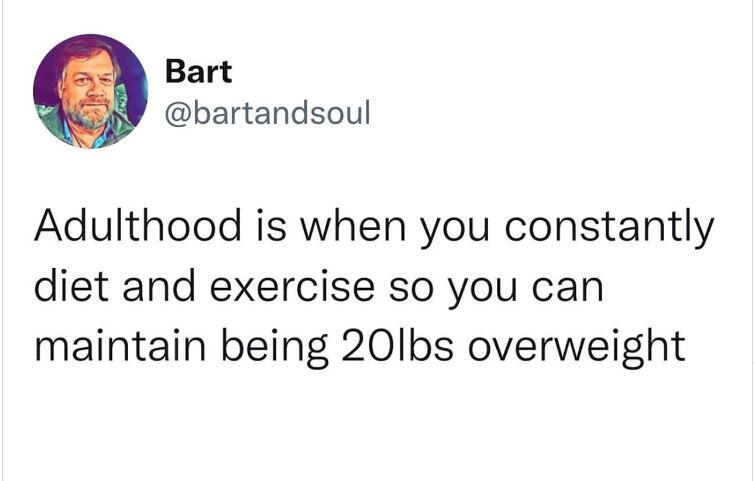
Well, for a change, let’s actually learn something valuable about the diet industry.Studies show that over the long term (3 months or more), no one diet causes any significantly more weight loss when compared to another (Keto vs low fat vs high carb vs high protein vs low carb etc).At the end of the day, they all based on some form of restriction, namely:
- Time restriction (think intermittent fasting)
- Nutrient restriction (think Keto)
- Calories restriction (think Weigh Less)What sets one diet apart from another, is the dieter's ability to adhere to its rules over the long term! In other words, CONSISTENCY trumps any other factor and theory on when and what to eat.Think about that carefully.The word consistency does not equate to uncontrolled eating, no rules and structure. It is quite the opposite. Consistency is about having a (realistic!) approach and plan that you execute day in and day out. It’s about finding a rhythm to your eating where you consistently follow the same pattern of eating time and time again. One that you enjoy.A rhythm of eating the same breakfast everyday may sound boring but when the breakfast you have chosen is based on food you actually like (as opposed to what some diet has told you to eat), you will love it.It also means that when you eat the cake at the next social gathering, it comes without the guilt that you have broken your diet, secure in the knowledge that it is part of your regular rhythm.So next time you are tempted to start another diet - PAUSE and reconsider whether you should be starting in the first place? Pour that energy into some deep thinking on how you can rather set up a rhythm to your eating that you can follow for the rest of your life.And to all the girls out there who have spent years dieting just to maintain their preferred weight - give yourself a hug.XXX
TanyaPS for more info on how to find your rhythm reach out to me or check out this link to Newsletter 4
If you enjoy these newsletters, sign up here to receive them straight to your inbox
NEWSLETTER TEN
Welcome to the Always Off Diet Newsletter, for weekly insights to help you effortlessly maintain your preferred weight without dieting. You can gain control of your eating through uncomplicated mindset, behavior and rhythm changes.
If Food is Fuel - Then What is Chocolate Cake?
There was a catchphrase a few years back that said "food is just fuel” or “eat to fuel, not fill”.Are you kidding me?What is chocolate cake? It’s not considered “fuel” for your body from a nutrient perspective but it tastes damn good.In defence of the fuel theory, many diets make scientific sense. As we touched on previously, weight loss can be achieved through restriction in one manner or form, namely:- Time restriction (think intermittent fasting)
- Calorie restriction (think Weight Watches)
- Nutrient restriction (think Keto)If the diet is ‘well balanced’, it provides a balance of macro and micro nutrients whereby you are physically satisfied and don’t feel hungry.Adherence should be easy - you have all the fuel you need.So what is the issue?The biggest problem is that the industry focuses its attention on the physical inputs and outputs associated with food and energy.But this is just the tip of the iceberg. There is far more to food than physical satisfaction and hunger.What about eating food because it looks delicious, because you are having an emotional day, because you are at a birthday party, because you are bored, because the clock says it is lunch time ….?Sometimes when you eat food, it is not just for fuel! It's called being normal.Below the surface, your emotional and social satisfaction can be more of a driving force than merely a physical need.The best part is that you are able to manage this and use it to your advantage to enjoy food whilst still maintaining your preferred weight.
Here are five great tips to get you started:These tips have been summarized here but feel free to reach out if you want more information.1.) Find a sustainable rhythm to your eatingCall it a routine, habit, rhythm etc. - finding a sustainable pattern to your eating is the most powerful thing you can do. It essentially involves deciding on three different ‘rhythms’ which centre around eating the same food day in and day out based on food you love.Through this simple mindset and routine changes, you will be able to maintain your preferred weight whilst still living a healthy and happy lifeCheck out this link to a free deep dive on finding your rhythm - https://tanyaknowles.me/#newsletter42.) Recognize your negative triggers and identify how best you can manage themDoes a visit to the snack cupboard late evening set you off? Are you starving late afternoon waiting for dinner and wolf down half a box of cookies? How about Sunday evenings binge because you know you need to be ‘good’ from Monday morning? Does eating one ‘bad’ food, set you off into a ‘fk it” mindset eating everything you can find.If you are able to identify the triggers that lead to negative habits and behaviours, it is a powerful starting point to change them.Simple by recognising and documenting them, you are able to put measures in place to curb their effect.It could be including chocolate every night into your rhythm or actually just having a set afternoon snack everyday. You may have a rule that you don’t eat anything after you have brushed your teeth in the evening and move that time forward on a Sunday. Or doing a deeper dive on food to realise there is no such thing as good and bad foods.The key is to discover what works and does not work for you.3.) Shift your mindset away from dietingBreaking the dieting cycle and mindset will set you free.You will stop thinking and obsessing about food all day and switch from eating unnecessary food that is supposedly “healthy or good” for you to food you actually enjoy (which ironically often includes so-called “healthy” food).When ‘forbidden’ foods are readily available, they lose their novelty. You can stop the eating extremes (all or nothing /’last supper’ mentality), knowing you can have your cake and eat it - pun intended.4.) Set up your environment to make things easierWhy swim against the tide? Help yourself by making your life and environment easier.It can be anything like keeping the snacks in an inconvenient place where they are not easily visible and accessible (works like a bomb!) Or sleeping in your workout clothes so that it's one less barrier to getting going on a cold morning to exercise (I do this all the time and it is life changing!). You may even make an effort to hang out with some friends who seem to be more aligned with the person you aspire to be.5.) Have a plan for all 365 days of the yearDo you ever feel like your body is in a tug of war between the weekdays and the weekends? We are ‘good’ Monday to Friday and then undo all our efforts on the weekends.Quitting dieting is not about eating whatever you want and having no having no control. It is quite the opposite.It’s about having a realist plan and approach to your eating 7 days a week, 365 days a year. It's about making sure you are fulfilling your physical and emotional needs when it comes to eating so that you have an approach and a rhythm for weekdays, weekends, holidays, vacations, business trips etc.Those rhythms will all be different but the point is they provide you with a structure and control to eat and enjoy food according to your circumstances, removing the mental, emotional and physical energy it takes dieting all the time.You are not a superhuman robot who can think of food as just fuel. Open your mind to the idea of looking at your mindset and behaviours around food and your body to find true freedom.Until next timeXXX
Tanya
If you enjoy these newsletters, sign up here to receive them straight to your inbox
NEWSLETTER ELEVEN
Welcome to the Always Off Diet Newsletter, for weekly insights to help you effortlessly maintain your preferred weight without dieting. You can gain control of your eating through uncomplicated mindset, behavior and rhythm changes.
The Most Unexpected Characteristic of
Successful People
Something changed for me this week. I saw a post from Sahil Bloom that gave me the courage to share more about one word that I think no one wants to hear.I have spent many weeks avoiding writing about this elusive word with grand plans that I was going to put a sexy spin on it in the hope of disguising it as something exciting for my readers. But there is no getting around it. It is what it is.So here is the big reveal. And the word is….“BORING”For those who have not heard of Sahil Bloom, he is a prolific and inspirational writer who captivates millions of people every week through his insights and bi-weekly newsletter called “The Curiosity Chronicle.” He is one of those people who just seems to have the Midas touch when it comes to life, relationships and business and is able to articulate this value extremely well for his followers. His content is often thought provoking and well worth a read.Sahil published this piece:
The post attracted thousands of likes and hundreds of comments from people affirming the view. I could not find one differing opinion.The current craze in self-help books is that they all refer to the ‘boring’ concept in one way or another. Be it about habits, consistency, the compounding effect, the power of patterns, etc.The underlying message is the same. In order to be successful at anything, you need to be boring and do the same things day in and day out. This compounds over time to give you extraordinary results.Be it losing weight, running a successful business, getting in shape, growing your audience on social media - it all comes down to the same fundamental concept.So why have I avoided writing about this?Well at the root of it, it’s not exactly some shiny, miracle sounding diet idea that if you just take this pill or eat 20 baked beans for breakfast then you will lose / maintain your weight and everything will fall into place.Telling people to be boring is well … boring. You don’t want to hear that.But it is the cornerstone of a successful and happy life and relationship with food.For almost 3 years from Monday to Friday, I have eaten the same thing at the same time every day*. Do I find it boring?Surprisingly no! I absolutely love it.Firstly what I am eating is food I have chosen and actually enjoy (not a prescribed diet). Realistically, by following this idea, I can’t and don’t want to eat pizza everyday but I do love cookies and can have them all the time so I eat two every night after dinner.For the first time in my life, I feel in control of my eating and my relationship with food and my body. The angst I used to experience obsessing over food and what to eat next is gone whereby I don't even need to think about it anymore. I have saved so much time, as well as mental and physical energy, with the added bonus that grocery shopping has become so much easier!Was this an overnight revelation? Absolutely not! In some ways I stumbled across this way of eating (which is a whole other story about fish paste!) and in other ways I was consciously looking for a sustainable way to quit perpetual dieting without gaining weight.Overall it probably took me two years to ‘get it’. It was hard. It took time. I still have good and bad days. BUT it was worth it! And by sharing this with you, I hope to help you fast track and leapfrog your journey forward to create a relationship with food and your body that you love.
And so I leave you with one parting thought - be boring.Till next time.XXX
TanyaPS. A friend recently shared with me that Victoria Beckham (who is too skinny for me) has eaten the same thing for dinner for the last 20 years. I also discovered that Jennifer Aniston has the identical meal for lunch every day so just maybe we are onto something!*I eat the same thing at the same time across all meals everyday with the exception of dinner. This is always a mix of protein, veg / salad and carbs. It's called my daily rhythm. If I am at a restaurant or have a social engagement I try to order something off the menu that I will enjoy and is similar to what I would eat normally. There is a different rhythm I follow on weekends which is planned ahead of time based on social engagements.
If you enjoy these newsletters, sign up here to receive them straight to your inbox
NEWSLETTER TWELVE
Welcome to the Always Off Diet Newsletter, for weekly insights to help you effortlessly maintain your preferred weight without dieting. You can gain control of your eating through uncomplicated mindset, behavior and rhythm changes.
3 Antiquated Approaches to
Dieting that Need to Die
Buzzword Bingo is a fun bingo-style game (also called BS Bingo) whereby you count industry buzzwords that others say during a meeting or speech. The more buzzwords they use, the more the person is said to be using irrelevant jargon to sound important and are unable to provide a proper explanation of what they actually mean in simple terms.
Whilst there are many dieting buzzwords that need to die, here are 3 of my favourites that may be holding you back from achieving your goals.Buzzword One:
“The 80 / 20 rule”Anyone good at math?The 80/20 rule in a dieting context loosely means that you are being “good / eating healthy food” 80% of the time and being “bad / eating unhealthy food” 20% of the time.But has anyone done the math on this?Let's say there are 31 days in a month (which accounts for the majority of months in a year), in order to follow the 80/20 rule, it means you would need to be ‘good’ for approximately 25 days in a month and can be ‘bad’ for 5 days.The problem is that most of us think about the 80/20 rule in terms of weekdays versus weekends. In other words, I diet from Monday to Friday and then go nuts on the weekend and eat everything in sight. To compound matters, Friday nights seem to slip into the definition of the ‘weekend’.So what is supposed to be 80/20 is much closer to 40/60.No wonder something is not right!While the rule itself makes sense on paper, 80/20 is easier said than done.What should you do instead? Read to the end for some great actionable advice.Buzzword Two:
Cheat meal / daysThe idea of a cheat meal / day is that once a week, you are able to ‘cheat’ and break your diet and eat whatever you want.Firstly, anything using the word ‘cheat’ implies you are doing something wrong - it is 100% normal to over indulge on a meal / day from time to time. You are not cheating or breaking some rule - it’s called enjoying food and life. This type of mindset leads to feelings of guilt and that you have done something wrong.You starve yourself all week, cutting calories and exercising only to swing to the other extreme on your cheat day. Essentially, you end up undoing everything you have worked towards and end up back where you started. Unmotivated and depressed. If you need a cheat meal, it shows your diet is not enjoyable or sustainable.The cheat meal does not do the trick! You have this pent up restriction that when you do break it, it is either not enough or, even worse, you don’t get to eat exactly what you want to eat (like saving your cheat day to attend a party and the food is terrible!). Your taste buds get over-stimulated with one taste of the forbidden food and go nuts - feeling guilty and sick afterwards because you ate things you didn't really want and enjoy.You feel like you have earned it and justify that you deserve it. You have been ‘good’ all day or all week and then indulge unnecessarily as a reward for your ‘good’ behaviour.Finally, you plan your cheat day for a Saturday but then Sunday rolls around. You have another social engagement or wake feeling bloated and terrible from the day before. Your one cheat day becomes two cheat days, swearing that you will start afresh on Monday with your diet.Buzzword Three:
Good versus Bad FoodsWe all do it i.e. place food in good and bad categories. It’s not so much the fact that we think this way but the effects that this type of thinking has on our psyche.By classing food as good versus bad, it often leads to the ‘Forbidden Food’ effect. This is the name given to the human tendency to want something more if it is off-limits or when something is unavailable, it becomes even more desirable.When you label foods as “good” and “bad” you are essentially making so-called bad foods off-limits and ironically more desirable.To compound this, it creates “the last supper effect” or “Oh well” effect - in other words we eat as much as we can now because we have told ourselves that we are not allowed to eat it again or you have had one “bad” food so you might as well go big and eat everything in sight as you will start your diet again tomorrow.So what is the solution?There is one common thread in the above 3 buzzwords. They drive a mindset which places food and our eating in two mutually exclusive camps. In other words:- 80% (on diet) versus 20% (off diet)
- Following an eating plan (on diet) versus Cheat day (Off diet)
- Being good (on diet) versus being bad (off diet)This black and white thinking is killing your relationship with food and your body. Life is not clear cut - it's full of colour.Here are 3 quickfire tips to bring some colour to your life and relationship with food:1.) Stop separating your weekdays versus weekends into 80/20 -Weekdays and weekends are different from a routine and social perspective, however, they don't need to be treated as two extremes on the same spectrum.Consider a more even approach to your week.This may (heaven forbid!) include eating more during the week and less than you currently do on the weekends. The primary thing, however, is to have a realistic plan and consistent approach for all 7 days of the week based on your work and social commitments.This is far easier than focusing on the maths involved to adhere to the 80/20 rule2.) Build a lifestyle you don’t need a cheat day fromFood is not for punishment versus reward. It is there to nourish you both physically, emotionally and mentally. Thinking that you need to earn what you eat just places food on an unnecessary pedestal with some higher power and control over you.Shift your eating to focus on consuming food you really like all time - not food described on a diet plan.This needs to come with a routine and control but by balancing out your normal meals / days from so-called cheat meals / days, the latter ones become unnecessary, allowing you to drop the guilt and binges.3.) Think that all food is good and badIf you think that strawberries are ‘good’ for you and a burger is ‘bad’ for you - well this is not true.It all depends on the circumstances. If you are looking for a snack on a summer day, then strawberries may be a nice option but are not going to fill you up and you will still be hungry.If you need to eat lunch then the hamburger would be ideal by offering some protein, carbs and perhaps a little veg from the lettuce, onion and tomato.So called ‘healthy foods’ do not necessarily equate to weight loss and vice versa. Yes the healthier option may contain better nutrients for your body but sometimes we need food to satisfy a social or emotional need which is just as important.We all know that one day in the gym is not going to give you a six pack. Therefore one ‘bad’ meal won't make you fat.
By changing your mindsets away from the idea that you have eaten something ‘bad’ you will be able to stop the ‘last supper’ and ‘oh well’ effect and gain control of your eating.
.
Buzzwords come and go but next time you hear any dieting advice from so-called guru’s and influencers, play along to make sure Buzzword Bingo catchphrases don’t lead you astray. Your life and the world is not black and white - it's full of colour. Enjoy it!XXX Tanya
Whilst there are many dieting buzzwords that need to die, here are 3 of my favourites that may be holding you back from achieving your goals.
If you enjoy these newsletters, sign up here to receive them straight to your inbox
NEWSLETTER THIRTEEN
Welcome to the Always Off Diet Newsletter, for weekly insights to help you effortlessly maintain your preferred weight without dieting. You can gain control of your eating through uncomplicated mindset, behavior and rhythm changes.
The Paradox of Choice: How Embracing Structure Can Unlock True Food Freedom
As seasoned dieters, many of us dream about having ‘food freedom’ - i.e. eating whatever we want and never gaining weight or more realistically being free from food rules that end up controlling our lives.The idea sounds great, but like anything in life, too much freedom can be bad.Take stereotypical teenagers - without boundaries their newfound freedom can lead to a lack of responsibility where they spiral completely out of control.While setting structures and limitations may seem counterintuitive to the concept of freedom, in many cases these constraints can be even more empowering.So today I want to talk about why having structure is key to unlocking freedom in terms of your weight and eating.Let’s dive in.The Problem with Too Many ChoicesHow often have you walked into a shop cluttered with an overwhelming selection of things to buy or items on sale and walked out empty-handed?
How about a restaurant with an extensive menu yet you can’t find something to order?This is commonly referred to as the Paradox of Choice*.We have a misconception that choice is a good thing. That somehow choice provides freedom, self-determination and independence.However, the Paradox of Choice suggests that having too many options can be a negative. An abundance of choice is burdensome and requires more mental effort. We end up either overanalyzing the options or becoming overwhelmed with what should be fairly straightforward decisions. What's more, when presented with too many choices, we ultimately feel unsatisfied - always wondering if we should have rather selected something else.Take a weight loss program that advocates various ideas of what you are allowed to eat for breakfast. By default, you are already hungry and thinking about food (you are on a diet after all!) but then need to spend time trying to decide what to eat.Your daily thought process goes something like this ….I wonder if I should have the oats with banana today or rather the eggs and toast? Maybe I should rather have the smoothie now and then I can have the oats tomorrow? The eggs are going to fill me up more so maybe I should rather eat those … You ultimately end up going around and around, spending unnecessary mental energy and time agonizing over a simple decision.Worst of all? You think more and more about food.The Power of StructureWhether you are building a house, trying to meet a work deadline, or surviving a morning to get the kids to school on time, no one can deny the power of structure and planning.When we are in a well-structured routine, life just seems to ‘flow’. We can plan, make better decisions, manage stress and somehow enjoy life that one bit more. Overall structure brings us a sense of calm and organization to our lives which ironically unlocks a sense of freedom and control.How to Apply Structure to Your EatingThe power of a structure can easily be translated to our eating.Instead of spending your time looking for another diet that prescribes what food you can / cannot eat, rather dedicate that time to devising a set eating routine that works for YOU.Simply put, your daily eating rhythm is a time-based plan to eat the same thing at the same time most days. The big proviso is that this is based on the food you enjoy and have selected yourself.After more than 30+ years of dieting, this approach has transformed my life. It has been the cornerstone for me to consistently maintain my weight without dieting.By following a daily rhythm, your mind is no longer consumed with 101 food choices and you are constantly thinking about food all the time. You look forward to every meal and can’t wait to tuck in because you have chosen food you like upfront. You can formulate a predictable pattern for your eating to remove the yoyo obstacles that hinder your weight loss and maintenance efforts.The result?A powerful structure that gives you true freedom and control to manage your diet and weight.Until next time.
XXX
Tanya*Shout out to Justin Welsh for the inspiration for this week’s newsletter. He spoke about the Paradox of Choice in a recent article on business and I thought the same principles apply to food and eating.
If you enjoy these newsletters, sign up here to receive them straight to your inbox
NEWSLETTER FOURTEEN
Welcome to the Always Off Diet Newsletter, for weekly insights to help you effortlessly maintain your preferred weight without dieting. You can gain control of your eating through uncomplicated mindset, behavior and rhythm changes.
What to Do When Your Own Advice Fails You: Lessons from My Biggest Setback
Last week, I broke every rule and questioned everything I stand for.My weekly newsletters aim to give actionable advice to readers to maintain their preferred weight without dieting.And while I try not to write about ‘me’, I had a bad week and felt that this week's edition of the newsletter might help you, too.Being an advocate for eating and weight management is not easy. I feel that my eating is under scrutiny and there is this pressure to be perfect all the time.Be it bumping into a friend in the local supermarket and having them peer into my trolley to analyze what I am buying, to order pizza at a restaurant and friends innocently asking if it is allowed on my ‘diet’.I recently had a terrible weekend when it came to my eating. I broke every one of my own rules and was devastated, leading me to question everything I preach to others. After all, I am advocating that I have ‘the answer’ to managing your weight but here I am failing in my own right.The weekend invariably led to the same self-bashing, self-sabotaging conversations in my mind. I went through the classic all-or-nothing diet mindset (I have eaten so badly, so I might as well keep going and will start afresh on Monday). I have been so bad, so next week, I am going to be super strict with my eating. Maybe I should just follow a diet for a week or so to get back on track, etc.And then two things happened.Firstly, I was listening to a podcast with Layne Norton (a renowned fitness, nutrition, training, and health advocate who has a PhD Nutritional Sciences and is an IPF World Champion). He spoke about coaching a man who used to binge eat when he got home from a stressful day at work. Given the nature of his job, this was a 2-3 weekly occurrence. Through the coaching, they managed to make changes to his environment (having pre-prepared meals delivered as he arrived home) where his binges lapsed from 2-3 a week to one or two a month.I realized that the ‘bad’ weekend I just had, used to be EVERY weekend. I used to overeat every weekend, chastise myself constantly, and then start a diet EVERY Monday morning.By reflecting on the podcast and logically analyzing the last few months, I realized I have not had a ‘bad’ weekend in over 3 months. I am not perfect. I still have good and bad days, but I am making progress.Secondly, I saw this WhatsApp status (thanks Rowena) and it just hit home.
Perfection is the enemy of progress. If we try to be perfect all the time, we are never going to learn and move forward.I took the experience one step further by analyzing what had happened. My weekend and mindset had spiraled, and I felt I had taken 10 steps back.After some digging and soul searching, I managed to undercover a few things which may be the reason:- We recently returned from a two-week vacation where it is natural and normal to eat more (and gain a little weight). I had in my mind that I needed to get back to my eating rhythm ASAP and be ‘super strict’ about it. This was a diet mindset talking to me. Instead of trusting my philosophy and process (follow your standard daily rhythm and you will be back to ‘you’ in no time), I went back to my old way of thinking which just led to the diet binge cycle and mindset.- My social media feed has picked up that I love certain baked goods. Feed me a muffin, cookie, flapjack, scone, etc and you’ve got me. As I try to eat a fairly high-protein diet, the Instagram algorithm has done a great job showing me 101 recipes for high-protein flapjacks, banana bread, blueberry muffins, etc. Invariably I save these recipes so what happens? It shows me more of them.If you know anything about the Always Off Diet philosophy, I believe that being thrown with 101 food ideas and choices just makes you hungry and more obsessed with food. I realized that for the last 2-3 weeks my social media feed has just been flooded with one decadent-looking high protein Cinnabon muffin recipe after the next. What has it done? Made me psychologically hungry. Made me crave sweet things, and made me want to try them all (I even went out and bought the ingredients….)It’s not that I am not allowed to eat those things. I am. But the constant barrage of images and attention-grabbing social media headlines (“Decadent Biscoff High Protein Flapjacks without the Guilt”) sends me over the edge.So from today, I am back to my eating rhythm - one that I LOVE and enjoy. When the adverts come up for the next decadent high protein cookie, I will change my feed to say “not interested” (I already have 20+ recipes saved with all the same underlying ingredients and cooking method - I don't need any more) and I will remind myself that I am normal.My ‘bad’ weekends used to be a weekly occurrence. They are now barely a blimp on my food and weight journey.Until next time
Tanya
If you enjoy these newsletters, sign up here to receive them straight to your inbox
NEWSLETTER FIFTEEN
Welcome to the Always Off Diet Newsletter, for weekly insights to help you effortlessly maintain your preferred weight without dieting. You can gain control of your eating through uncomplicated mindset, behavior and rhythm changes.
3 Quick Fire Tips to Keep Your Weight in Check
How often have you been close to or reached your goal weight, only to regain and lose the same 5 kg (6-10 pounds) over and over again?When it comes to our diet and eating, we love to target a goal weight. Our minds, energy, and behaviors become fixated on achieving that set number on the scale.The real challenge, however, is not losing the weight. It is keeping it off.How do we continue to thrive, live and maintain our preferred weight, without constant dieting?Here are three key takeaways which may help you on your journey1. Fall in Love with Your Routine, Not the ResultIt's easy to view your goal weight as the endpoint, but that's missing the point. Life (and our eating) is a long journey, and reaching your goal weight is simply a checkpoint along the way—not the final destination.Instead of obsessing about reaching a fixed number on the scale, focus on falling in love with the lifestyle you create. When you establish a consistent lifestyle and rhythm (aka routine) for your eating and exercise, that is when you will achieve remarkable success and results.Build in small checkpoints to measure your progress along the journey. This might mean enjoying a socially busy weekend without unnecessarily overeating, keeping up with your exercise and training routine even after the big event, or being consistent with your eating rhythm over a couple of weeks.The key is to become conscious of these moments. See them check-in points as you progress through the journey of life. In other words,
fall in love with the process and the life you create.Rhythm + Checkpoints = Success2. Focus on Who You Are Becoming, Not Just What You Want to AchieveWe often spend our lives thinking we need to lose weight, continually starting new diets, buying fad foods, and trying the latest exercise trends—all in pursuit of that elusive goal weight.James Clear writes extensively about the importance of shifting your focus from thriving for short-term outcomes to rather focusing on the person you are becoming.
Here are some examples to consider:- I need to diet and lose weight versus I am someone who can maintain my preferred weight without dieting.
- I need to exercise versus I exercise regularly and enjoy it.
- I am not allowed to eat ‘bad’ foods versus I enjoy all food and stay in control of my eating.Model your behaviors on this new identity, not just on achieving a specific short-term goal and outcome. Be the person you want to become.3. Embrace the Imperfect YouNo one is perfect.The last mistake you made won’t be your last. You will make more mistakes. It is completely normal.
Criticizing yourself for slip-ups doesn’t undo them—it only makes you feel worse.Instead, view mistakes as a blessing! They are your best learning opportunities. Reflect on them, use them, and adjust your course. You will be able to move forward with renewed determination and become even better for it.Remember, the journey to lasting change is about falling in love with your lifestyle rather than the perfect outcome. By enjoying the process, embracing the person you’re becoming, and learning from each experience, you set yourself up for enduring success.Until next time
Tanya
If you enjoy these newsletters, sign up here to receive them straight to your inbox
NEWSLETTER SIXTEEN
Welcome to the Always Off Diet Newsletter, for weekly insights to help you effortlessly maintain your preferred weight without dieting. You can gain control of your eating through uncomplicated mindset, behavior and rhythm changes.
Have you ever wondered if those late-night Netflix binges are sabotaging your weight loss goals?
We’ve all seen catchy headlines like “Sleep Your Way to Weight Loss” or “Snooze More, Weigh Less.” But is it really true? How important is sleep when it comes to managing your weight, and how much difference can it make?The Sleep-Weight Connection
You might be surprised to learn just how crucial sleep is for weight management. Many dieters have found that prioritizing sleep can transform their weight loss journey.Research shows that sleep deprivation can lead to:- Increased Caloric Intake: People who lack sleep consume, on average, 385 more calories per day, with a significant portion coming from fats.
- Food Preferences: Sleep-deprived individuals tend to crave calorie-dense, high-carb foods to compensate for their lack of energy, leading to overeating.
- Reduced Fat Loss: Dieters who don’t get enough sleep lose 55% less body fat compared to those who sleep adequately, even when calories are controlled.
- Obesity Risk: Sleeping fewer than 7 hours per night increases the risk of obesity by 41%.
- Altered Brain Function: Lack of sleep affects brain function, making it harder to resist unhealthy foods, resulting in increased appetite and cravings.
- Increased Reward Response: Sleep-deprived individuals show a heightened response to high-calorie foods and are more willing to spend money on them.
- Heightened Sensitivity: Sleep deprivation increases sensitivity to the smells of high-calorie foods, leading to greater consumption.
- Late-Night Snacking: Staying up late increases your opportunities to eat, contributing to late-night snacking.
- Impaired Metabolism: Sleep deprivation is linked to lower fat oxidation and decreased muscle synthesis.
- Reduced Physical Activity: Lack of sleep leads to decreased physical activity levels, creating a cycle of reduced motivation to exercise.Given this glaring evidence, it’s worth considering why we don’t give sleep the attention it deserves. Imagine putting as much research, thought, and effort into your sleep routine as you do into your eating and exercise habits.The Science Behind Hunger HormonesResearchers have started to explore the connections between weight and sleep, linking poor sleep quality to appetite regulation and metabolic disorders.
Hunger is more than just your stomach grumbling; it involves complex chemical processes. Your appetite is controlled by neurotransmitters like ghrelin and leptin, which send constant signals to your brain. Ghrelin promotes hunger, while leptin contributes to feelings of fullness.It turns out that sleep deprivation significantly disrupts the regulation of these neurotransmitters, leading to increased appetite and diminished feelings of satiety.Sleep well, and you’ll be in a better position to manage both your appetite and weight.The Top Tip for Better SleepWhile there are many tips for improving sleep, one key strategy stands out:
'Go to bed at the same time every night'
Regulating your internal clock by going to bed and waking up at the same time daily is essential. Ditch the late-night social media doom scrolling, avoid heavy meals and caffeine, turn off that bedroom TV, and focus on creating a calming bedtime routine.Our bodies thrive on consistency, and sleep is no exception. Our circadian rhythm—the 24-hour sleep-wake cycle—is crucial for our body’s functioning. Misalignment can have serious consequences for your health and weight.By committing to a consistent bedtime, you can help regulate your internal clock, promoting better health and weight loss.So tonight, why not start a consistent bedtime routine? You just might unlock the power of sleep to help manage your weight. As John Maxwell said, “The secret of your success is found in your daily routine.”Until next time
XXX
Tanya
If you enjoy these newsletters, sign up here to receive them straight to your inbox
